
Sign in to your Collider account
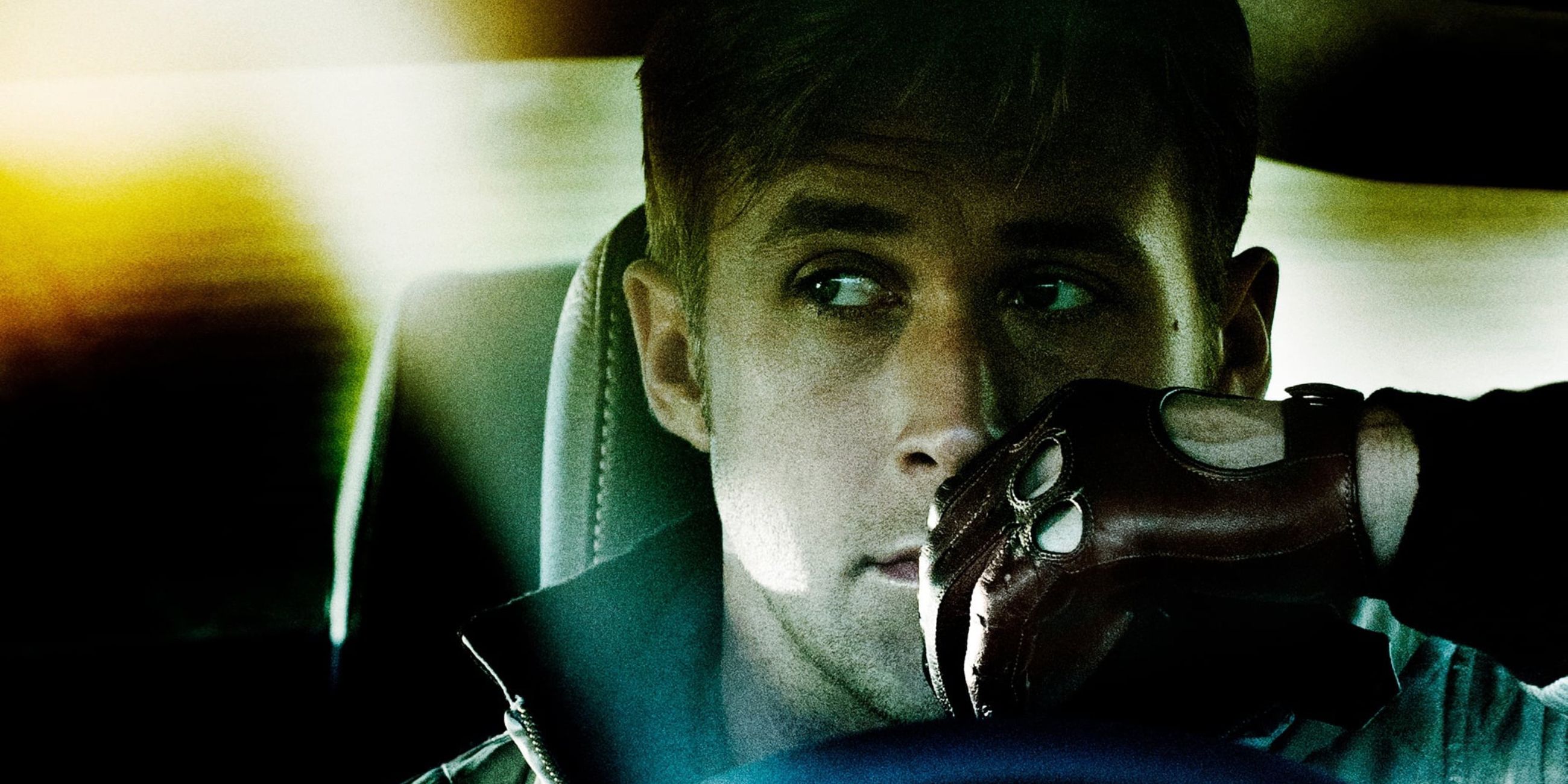 Image via FilmDistrict
Image via FilmDistrict
The film noir genre is a timeless genre that initially emerged on the silver screen during the 1930s and reached its peak of popularity during the 1940s and 1950s and is defined as the glory days of classic noir. During the 1960s, the genre was revitalized and became known as the subgenre, neo-noir or, in other words, "new" noir, and was established by box office hits such as Cape Fear, Chinatown, and Dirty Harry.
The neo-noir film features the traditional tropes of the classic noir but with a modern twist on techniques and themes such as paranoia, intense violence, and graphic sexual content. Through the years, countless neo-noir films, including L.A. Confidential and No Country for Old Men, have kept the subgenre alive and well. While there are plenty of neo-noir films worth seeing, some titles like Collateral starring Tom Cruise and Jamie Foxx, and Martin Scorsese's Taxi Driver are ranked by cinephiles as some of the most rewatchable neo-noirs of all time.
15 'Mulholland Drive' (2001)
Directed by David Lynch
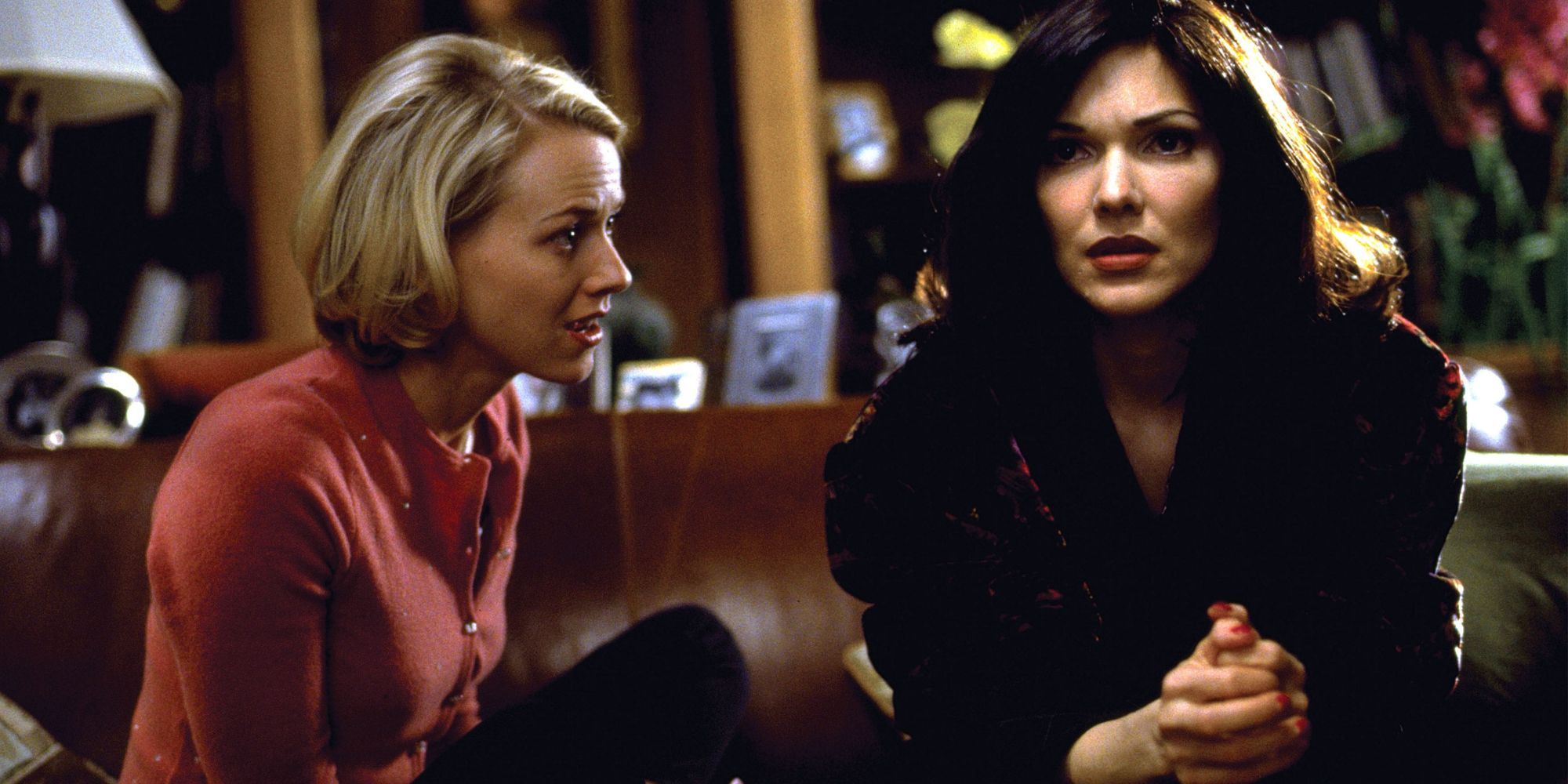 Image via Universal Pictures
Image via Universal Pictures
David Lynch's surrealist neo-noir, Mulholland Drive, is a bold piece of cinema that depicts a dream-like atmosphere at the center of Tinseltown surrounding two young women caught in a web of mystery and illusion. Laura Harring stars as a woman who, after being involved in a car accident, is suffering from amnesia and eventually meets an aspiring actress, Betty (Naomi Watts), who gives her the name "Rita." As they try to figure out Rita's true identity, the pieces slowly come together, revealing Rita's troubling past.
Mulholland Drive pulls from every element of the City of Angels, ranging from fame to organized crime, unfolding several different storylines that Lynch intricately weaves together, creating a one-of-kind neo-noir with an unusual but clever open-ended finale. The beauty of the movie lies in the ending, which is left up to interpretation. Audiences could watch it one time and come up with an opinion of what happened, while a second run-through may alter their initial opinion, making Mulholland Drive a spellbinding rewatchable neo-noir.
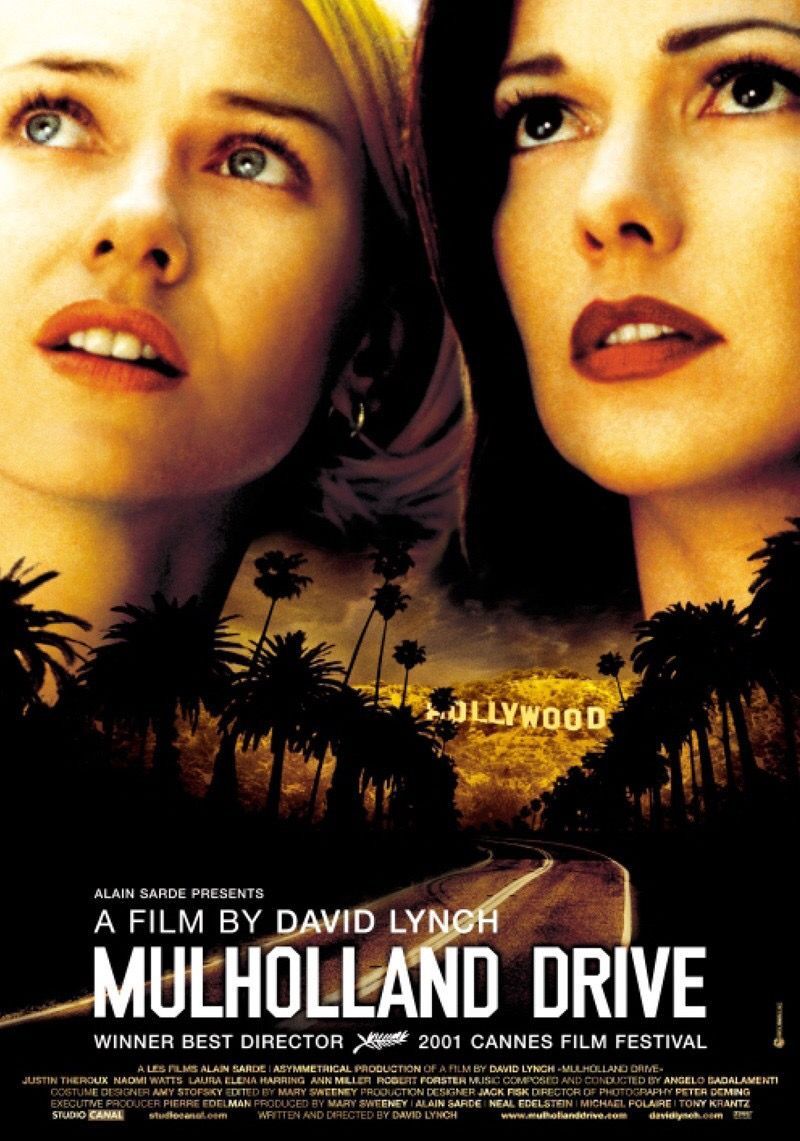
Mulholland Drive
Release Date October 19, 2001
Runtime 147 minutes
Director David Lynch
14 'The Usual Suspects' (1995)
Directed by Bryan Singer
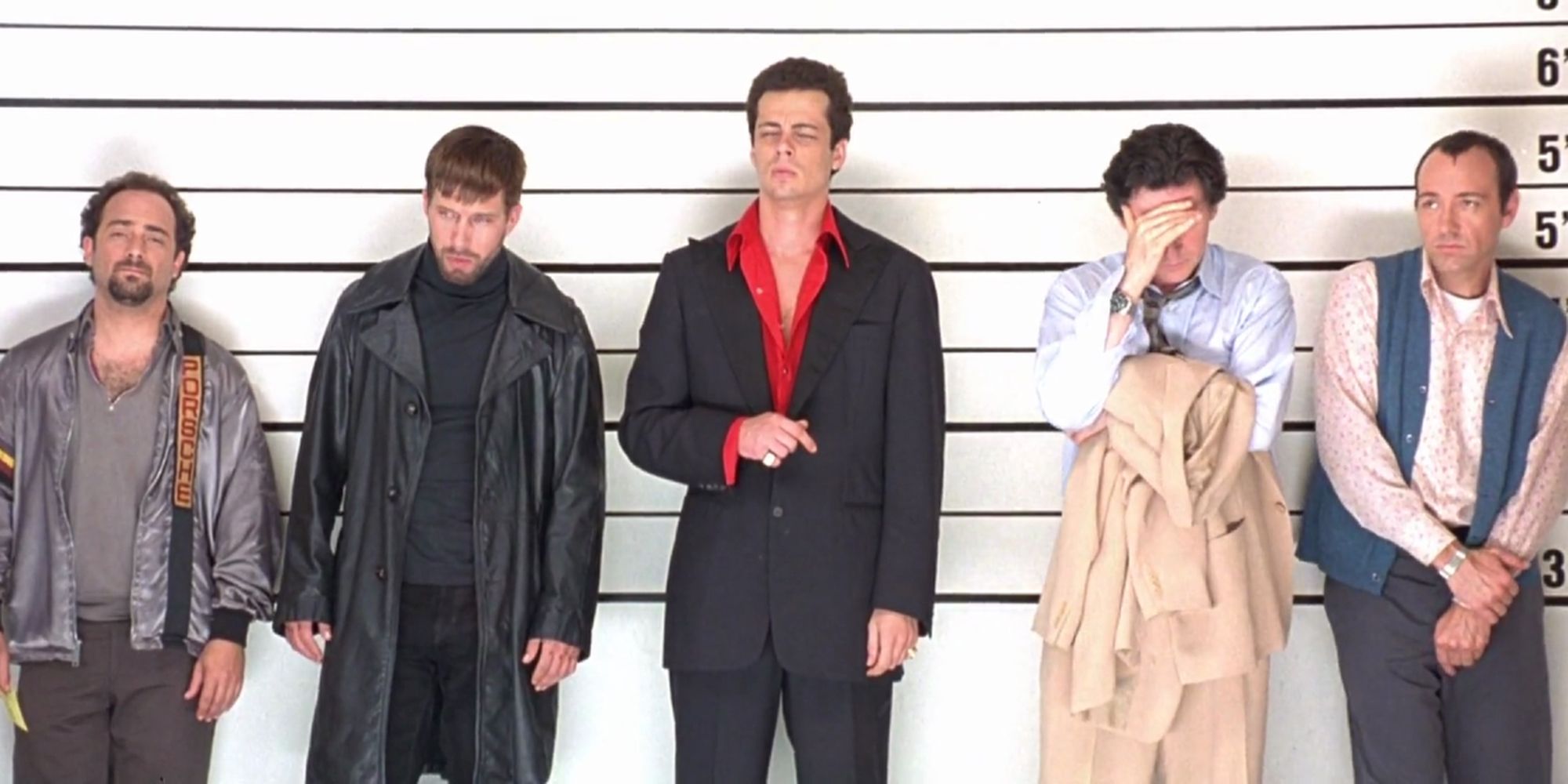
The Usual Suspects is a neo-noir crime drama that features one of the most shocking twists in cinema history that, no matter how many times someone sees it, never fails to give audiences chills. The movie follows a non-linear story surrounding the events of several seedy individuals who are pulled into a multi-millionaire dollar heist that ends with an explosion in the San Pedro harbor. With few survivors, authorities are left to rely on one of the surviving members of the group, Roger 'Verbal' Kint (Kevin Spacey), to fill in the blanks of what exactly happened.
While some may argue that The Usual Suspects lies more heavily in the crime genre, the film incorporates a number of basic elements of the film noir genre which are tailored to a modern criminal drama and an intriguing non-linear narrative that sets it in its own unique category. The film is recognized for its compelling mystery, shocking plot twist, and Spacey's signature performance, which earned the actor the Academy Award for Best Actor.
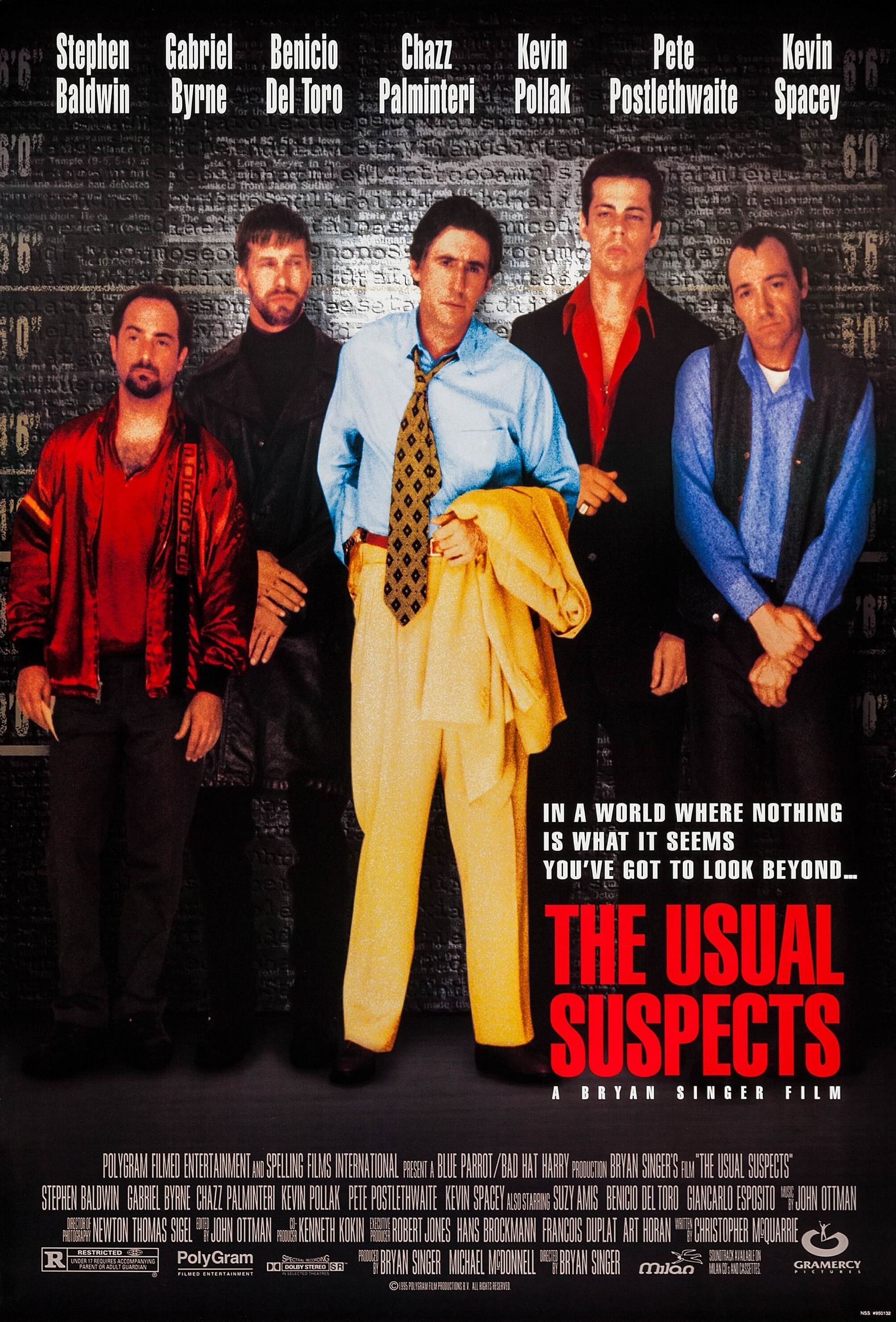
The Usual Suspects
Release Date August 16, 1995
Runtime 106 minutes
13 'Basic Instinct' (1992)
Directed by Paul Verhoeven
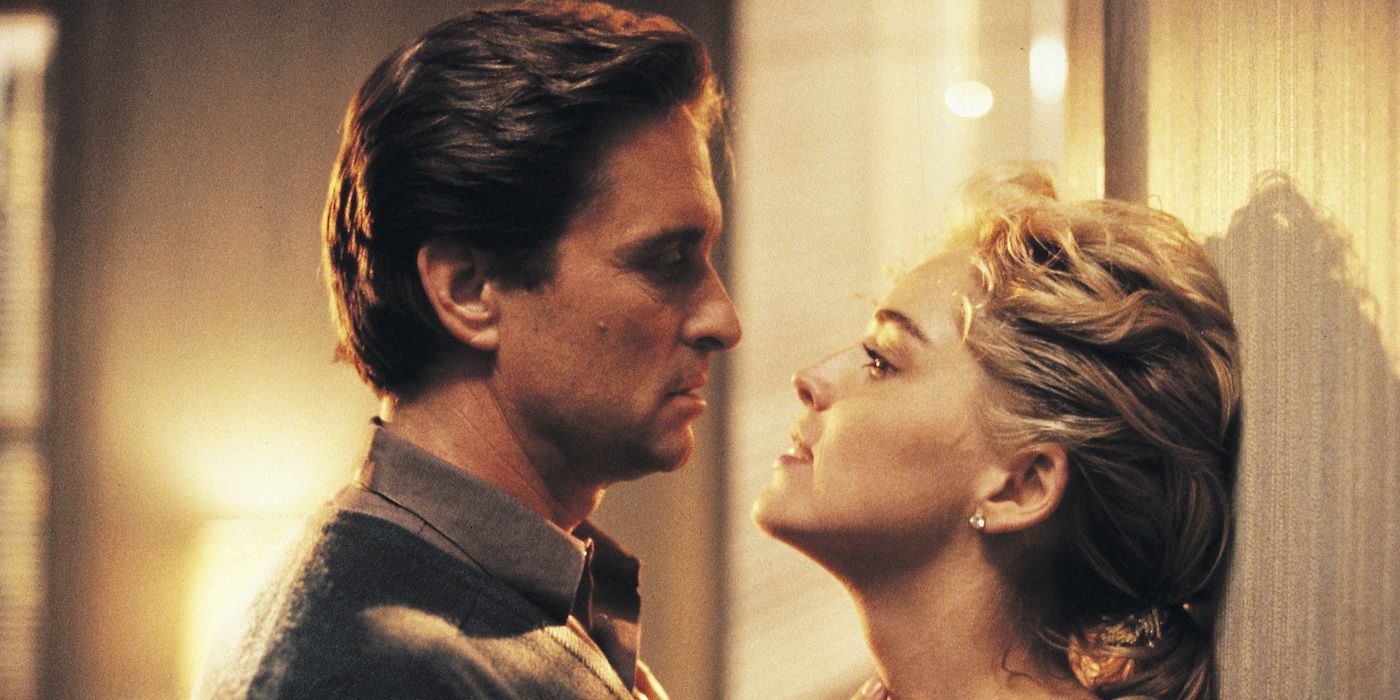 Image Via TriStar Pictures
Image Via TriStar Pictures
Basic Instinct ranks as one of the most iconic neo-noirs and erotic thrillers of the 1990s and is primarily known for Sharon Stone's powerhouse performance. Set in San Francisco, Michael Douglas stars as a homicide detective who is investigating the recent murder of a former rock star. When his investigation leads him to a successful crime novelist, Catherine Tramell, who, despite being the detective's number one suspect, seduces him into a passionate romance that threatens to cloud his judgment.
Basic Instinct is an exceptional neo-noir that puts a sexual twist on the traditional murder mystery that leaves audiences on the edge of their seats with unwavering anticipation. Despite initially earning mixed reviews, Basic Instinct stands out because of Stone's breakthrough performance as the classic ice-cold femme fatale, delivering a sensual and mesmerizing performance that is undeniably one of the star's finest.
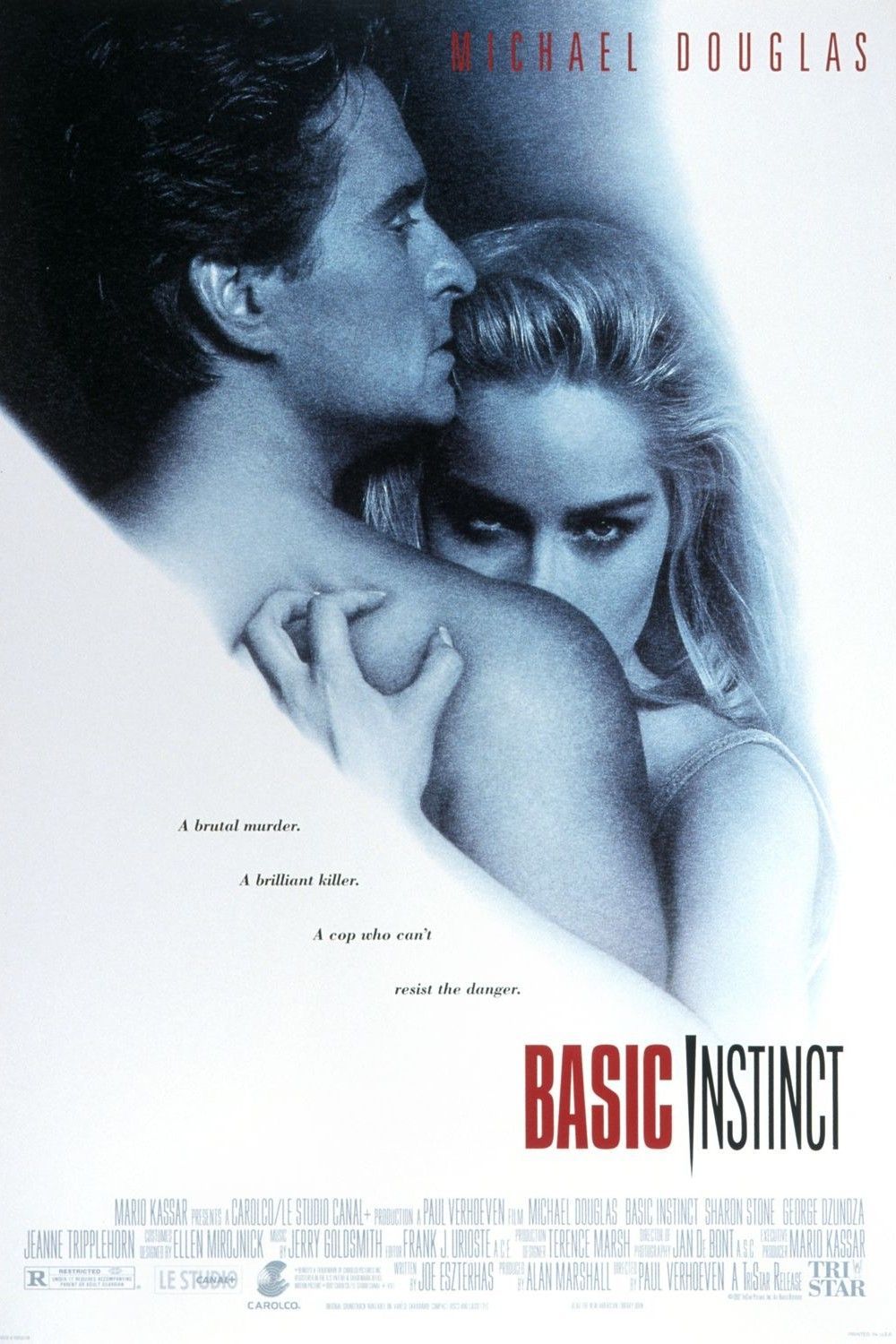
Basic Instinct
Release Date May 8, 1992
Runtime 128 minutes
Director Paul Verhoeven
12 'Fargo' (1996)
Directed by Ethan Coen and Joel Coen
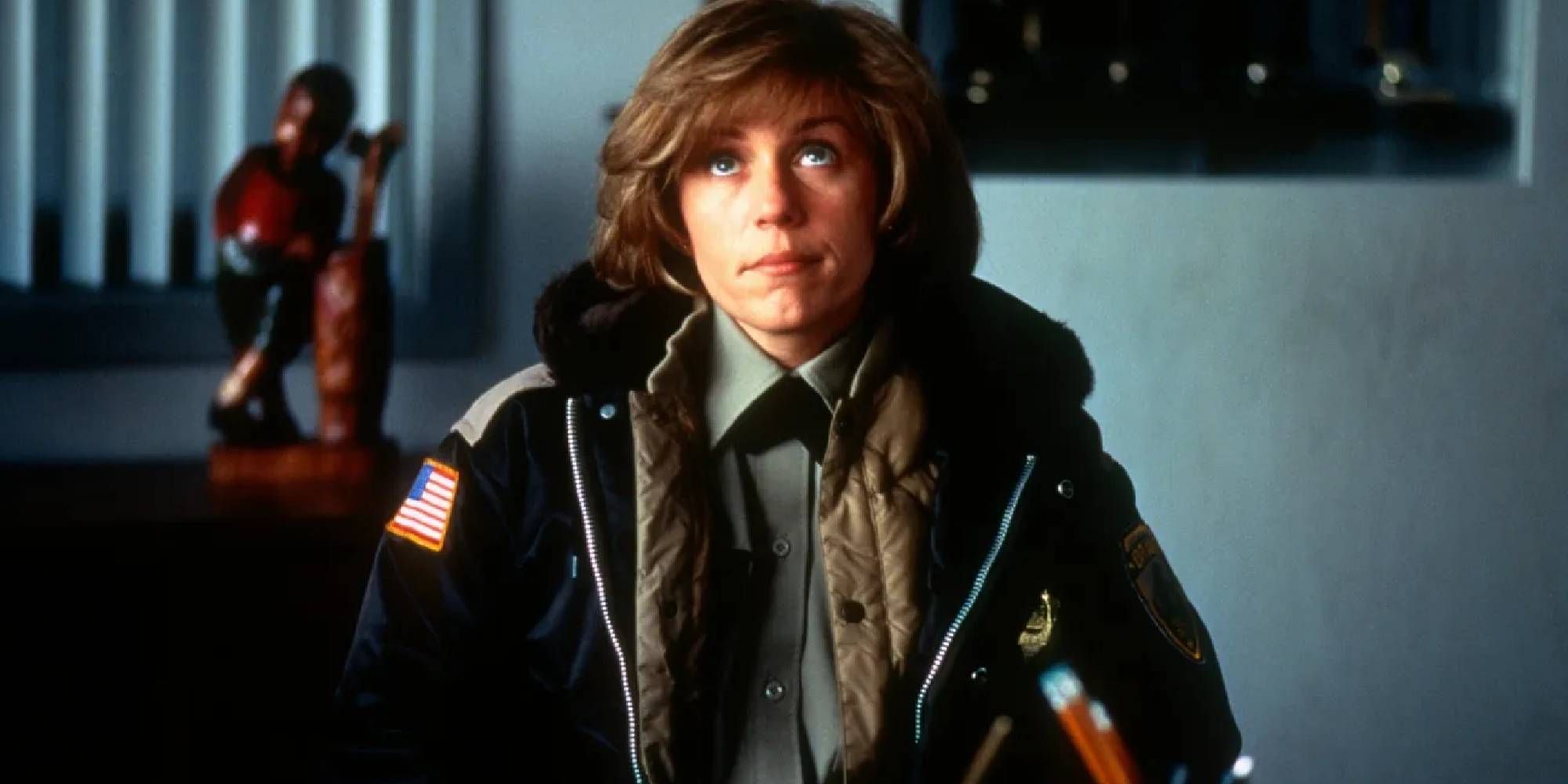 Image via Gramercy Pictures
Image via Gramercy Pictures
The 1996 black comedy crime movie, Fargo, follows a distinct neo-noir formula with the Coen Brothers' customary style of a small-town setting and an everyday lead character who finds themselves in unfamiliar territory. William H. Macy stars as a local car salesman who is desperate for money and decides to hire two men to kidnap his wife to extort money from his wealthy father-in-law. When the plan takes a sudden unexpected turn, things result in a triple homicide that is investigated by the town's pregnant police chief, Marge Gunderson (Frances McDormand).
Fargo has a refreshing sense of humor and satire that is rarely seen in other neo-noirs and the main reason why it is such a rewatchable neo-noirs. While the overall plot is alluring on an idiotic and curious level, the Coen Brothers' unique art of storytelling and intensely defined characters as well as the array of phenomenal performances (notably Dormand, who won the Oscar for Best Actress) is what makes Fargo a timeless and entertaining neo-noir for film fans.
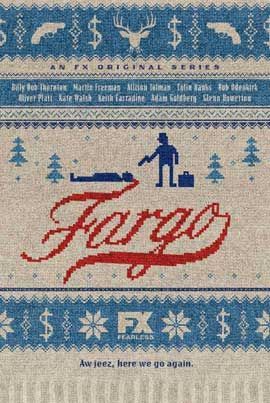
Fargo
Release Date April 5, 1996
Runtime 98 Minutes
Director Joel Coen, Ethan Coen
11 'Blue Velvet' (1986)
Directed by David Lynch
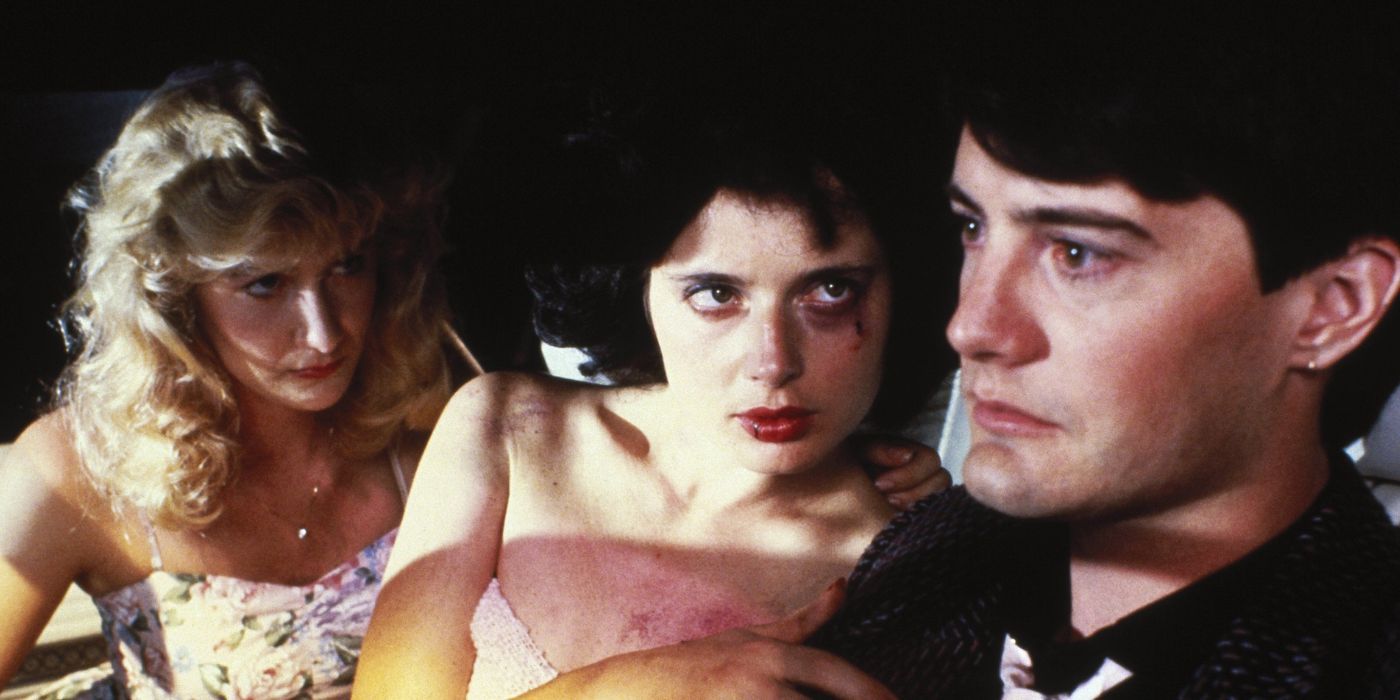 Image via De Laurentiis Entertainment Group
Image via De Laurentiis Entertainment Group
Kyle MacLachlan stars in the thrilling neo-noir, Blue Velvet, as a college student, Jeffrey Beaumont, who returns to his suburban home after his father suffers a near-fatal stroke. While walking home, Beaumont finds a severed human ear in an abandoned lot, which soon leads him to a mysterious nightclub singer (Isabella Rossellini) and a sadistic psychopath (Dennis Hopper) who reside in a dark, twisted underworld.
Blue Velvet is an essential neo-noir mystery and psychological thriller both written and directed by David Lynch, who is known for his surrealist style of storytelling. The film features an alluring sinister and ominous atmosphere riddled with a series of sublime performances that is unlike any other neo-noir to date. Initially, the film earned mixed reviews, many citing it as too sexualized and lacking any artistic purpose, but today, Blue Velvet reigns as one of Lynch's finest films as well as a vital contribution to the neo-noir genre that only gets better with multiple run throughs.
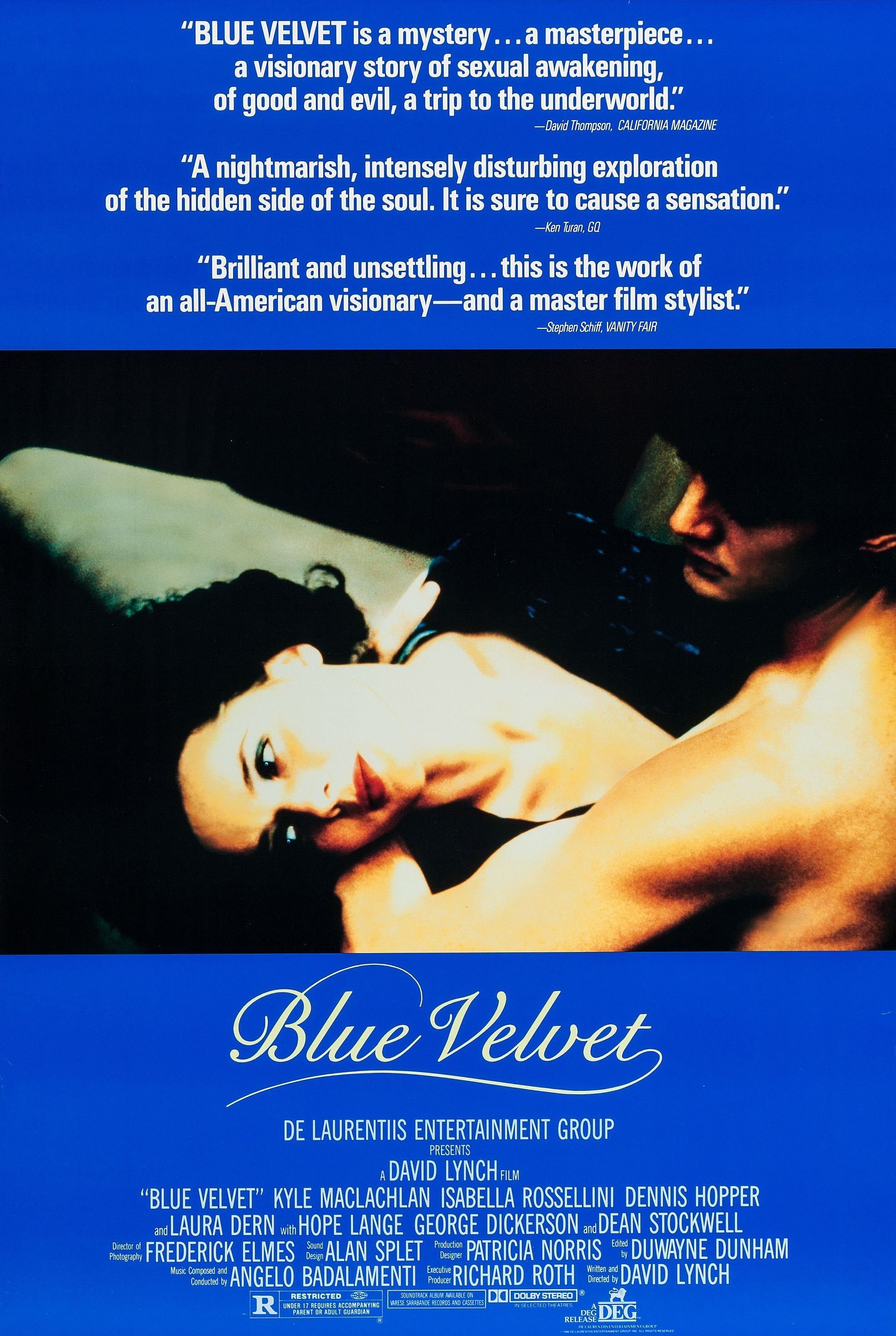
Blue Velvet
Release Date January 1, 1986
Runtime 120 minutes
Director David Lynch
10 'Drive' (2011)
Directed by Nicholas Winding Refn
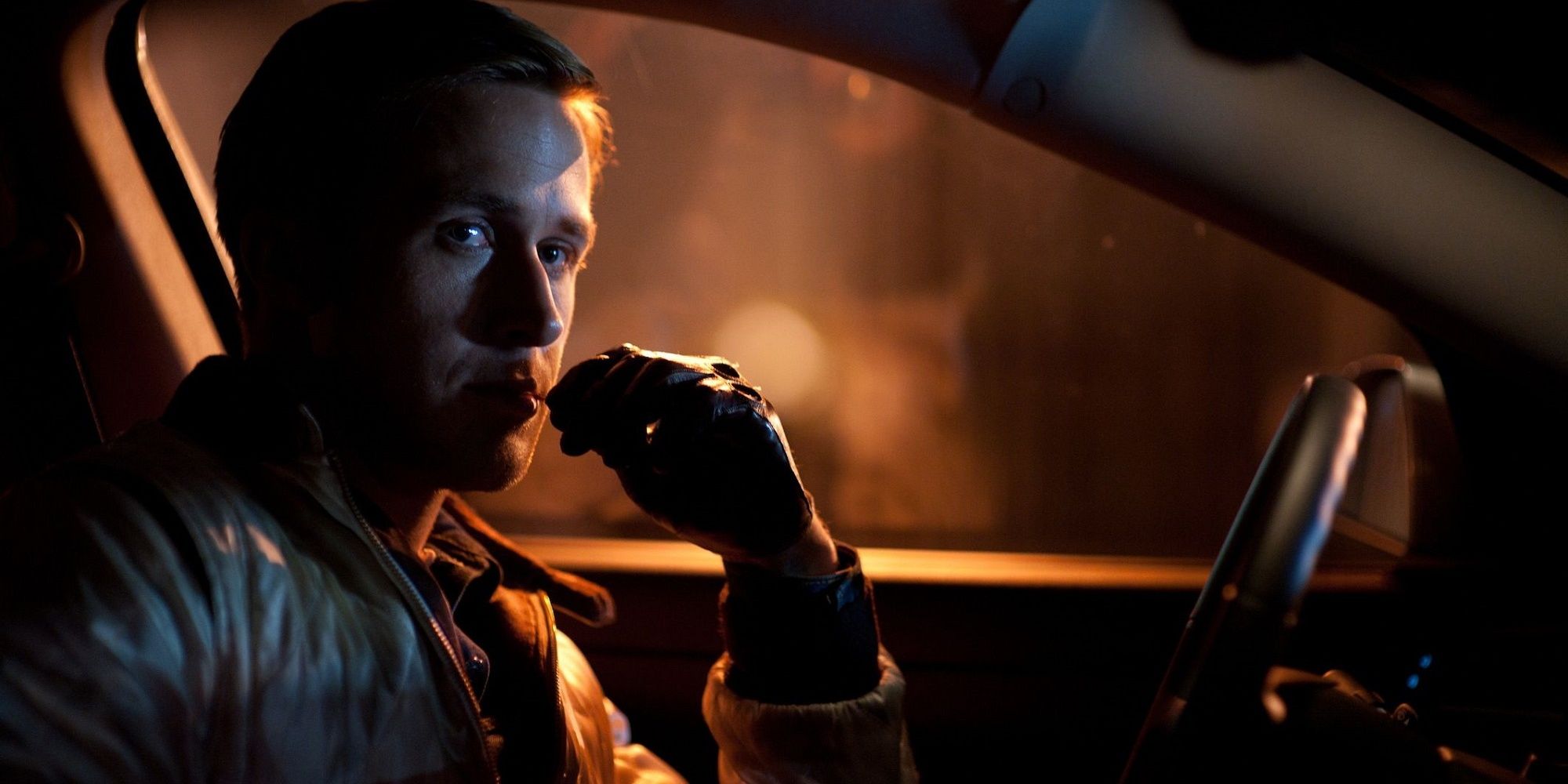 Image via FilmDistrict
Image via FilmDistrict
Ryan Gosling stars in one of the best neo-noirs in recent years, Drive, as an elusive man of all trades known as The Driver, who also works at night as a get-away driver for criminals. Typically, Driver keeps to himself, but he soon takes a liking to his neighbor, Irene (Carey Mulligan), and her son, but their relationship is interrupted after Irene's husband is released from prison. When Driver learns that Irene's husband owes protection money and is ordered to rob a pawn shop, he offers his service but the heist takes a deadly turn and ultimately puts Irene and her son in potential danger.
Drive is an intense, gritty neo-noir that also stars Breaking Bad's Bryan Cranston, Oscar Issacs, and Ron Perlman and was listed as the number one film of 2011 by Empire magazine. The film's nail-biting suspense and unyielding action are two vital elements that make Drive a crucial rewatchable neo-noir, but Gosling's overall performance takes the cake. Some might not be a fan of Gosling's character having a lack of dialogue and, while it's easier to convey emotions through words, Gosling does this just as effectively with his facial expressions and physical movements, which takes a certain level of talent and dedication.
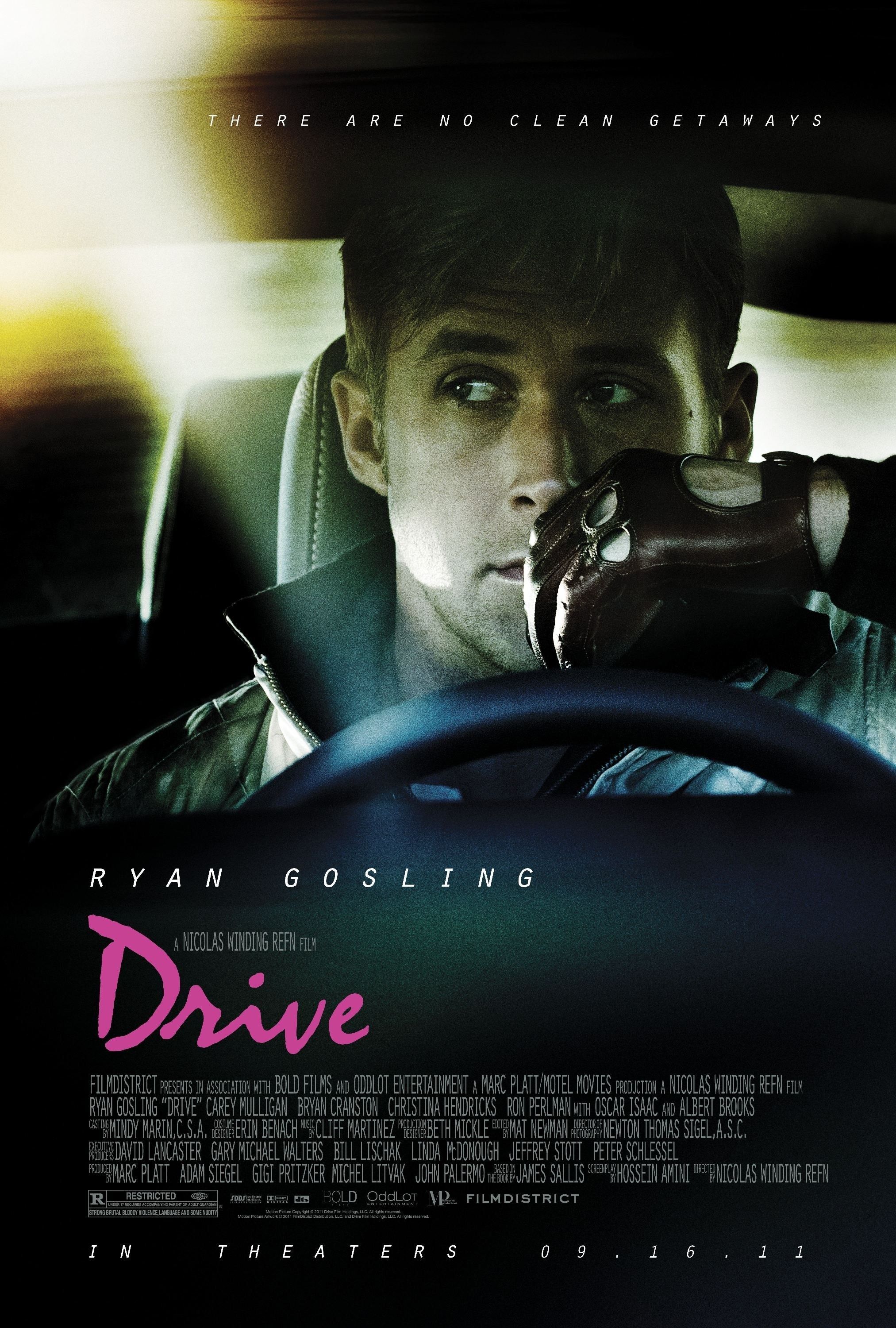
Drive
Release Date September 16, 2011
Runtime 100 minutes
Director Nicolas Winding Refn
9 'Body Heat' (1981)
Directed by Lawrence Kasdan
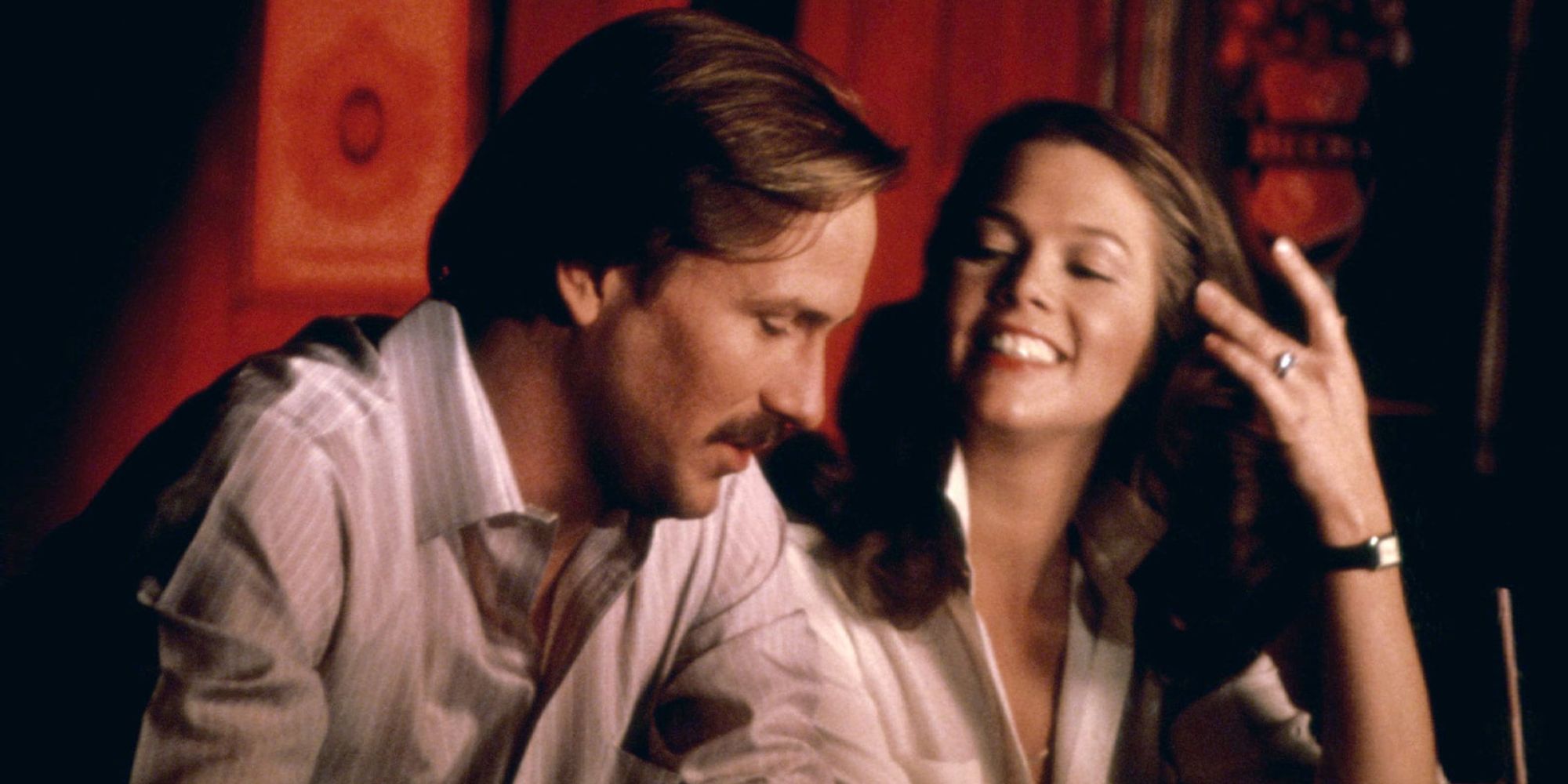 Image via Warner Bros.
Image via Warner Bros.
Body Heat is an erotic neo-noir starring Kathleen Turner as Matty Walker, who is an attractive young wife of a wealthy local businessman who becomes involved in a steamy affair with an attorney, Ned Racine, played by William Hurt. As the two engage in a lust-filled romance, they soon plot to kill Walker's husband, but after the job is finished, Racine slowly begins to learn that there is more to his lover than she initially led on, ultimately putting the attorney's career and his life on the line.
Inspired by Billy Wilder's classic noir film, Double Indemnity, Body Heat is a tantalizing neo-noir that features Turner in her breakthrough performance which gives a whole new sinister meaning to the classic femme fatale. While Hurt and Turner are undeniably sensual together, the constant twists and turns of the film's plot are what makes Body Heat one of the best rewatchable noirs. Body Heat's sexual tension and Turner's bombshell performance might be the initial allure for audiences, but the story that follows after the couple bumps off Mr. Walker is the heart and soul of this jaw-dropping neo-noir.
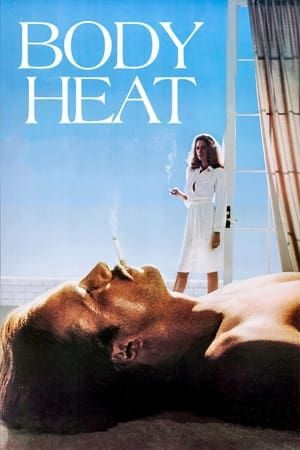
Body Heat
Release Date August 28, 1981
Runtime 113 Minutes
Director Lawrence Kasdan
8 'Collateral' (2004)
Directed by Michael Mann
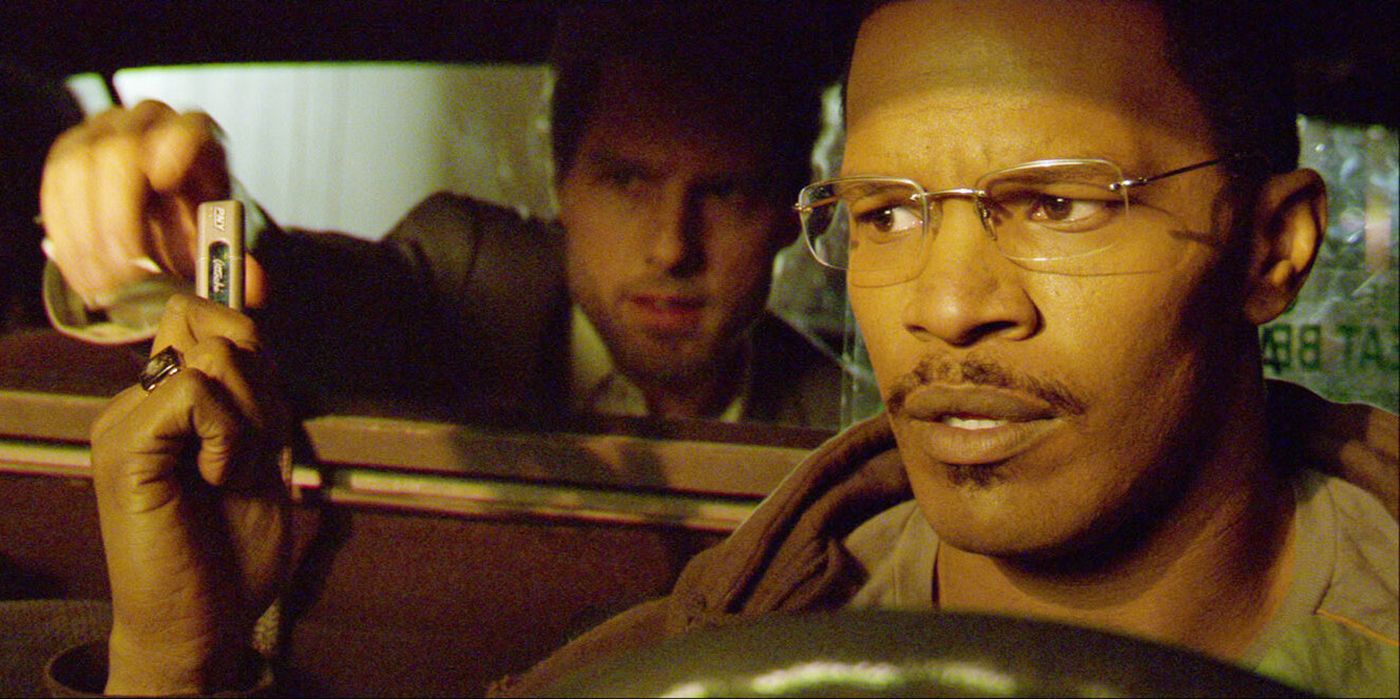 Image via Dreamworks Pictures
Image via Dreamworks Pictures
Jamie Foxx stars in the highly underrated neo-noir, Collateral, as a Los Angeles taxi driver, Max, who is about to clock out for the day when a mysterious man, Vincent (Tom Cruise) offers to pay him six hundred dollars to make five stops. Initially, the offer seems too good to be true to pass up, but when Max realizes that his passenger is a deadly hitman on a contract killing spree, his night takes an unexpected turn for the worst.
Collateral is a compelling neo-noir thriller featuring Cruise in one of his most unusual but captivating performances. Known for his heroic action films, Cruise steps out of his comfort zone with this against-type role and surprisingly proves his ability to portray a convincing merciless killer. Cruise's portrayal might be one of the film's most intriguing aspects, but Foxx delivers a showstopping performance, adding a bit of comic relief to the film's unwavering level of suspense. Between the performances and the tedious plot, Collateral is an epic homage to the classic criminal noir and easily one of the most rewatchable neo-noirs.
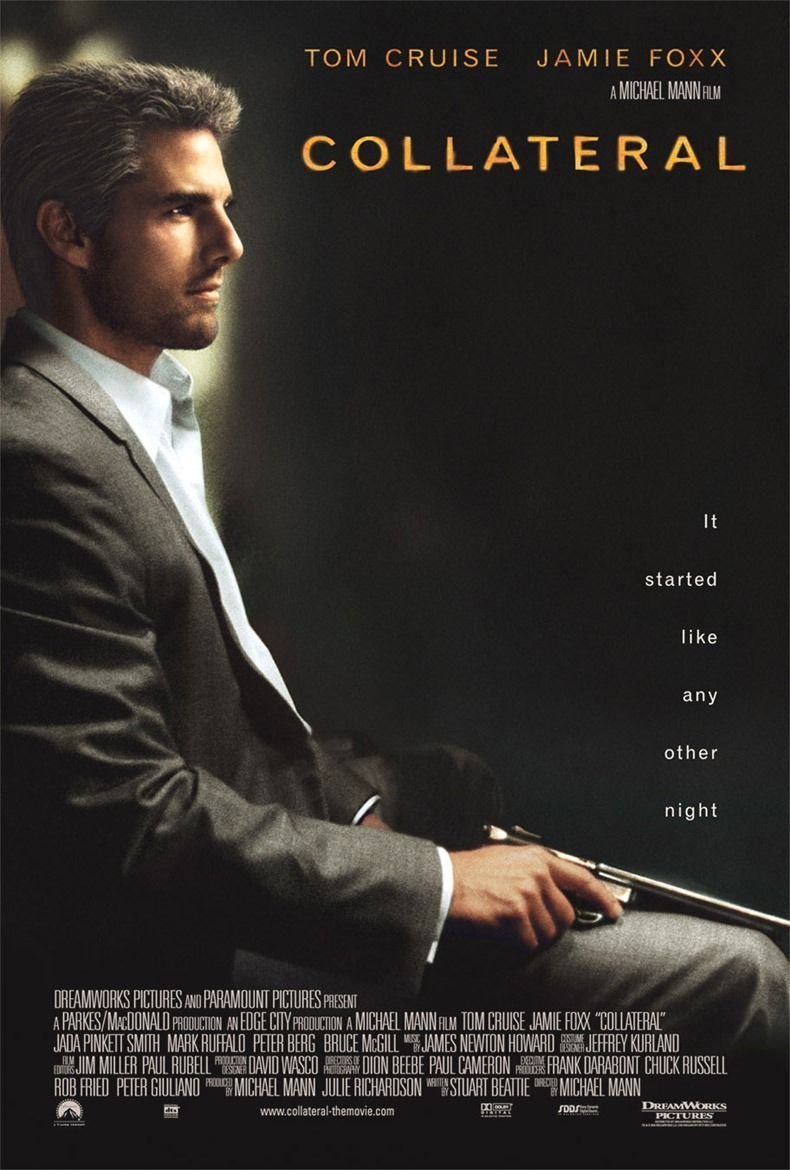
Collateral
Release Date August 6, 2004
Runtime 120 minutes
Director Michael Mann
7 'Cape Fear' (1962)
Directed by J. Lee Thompson
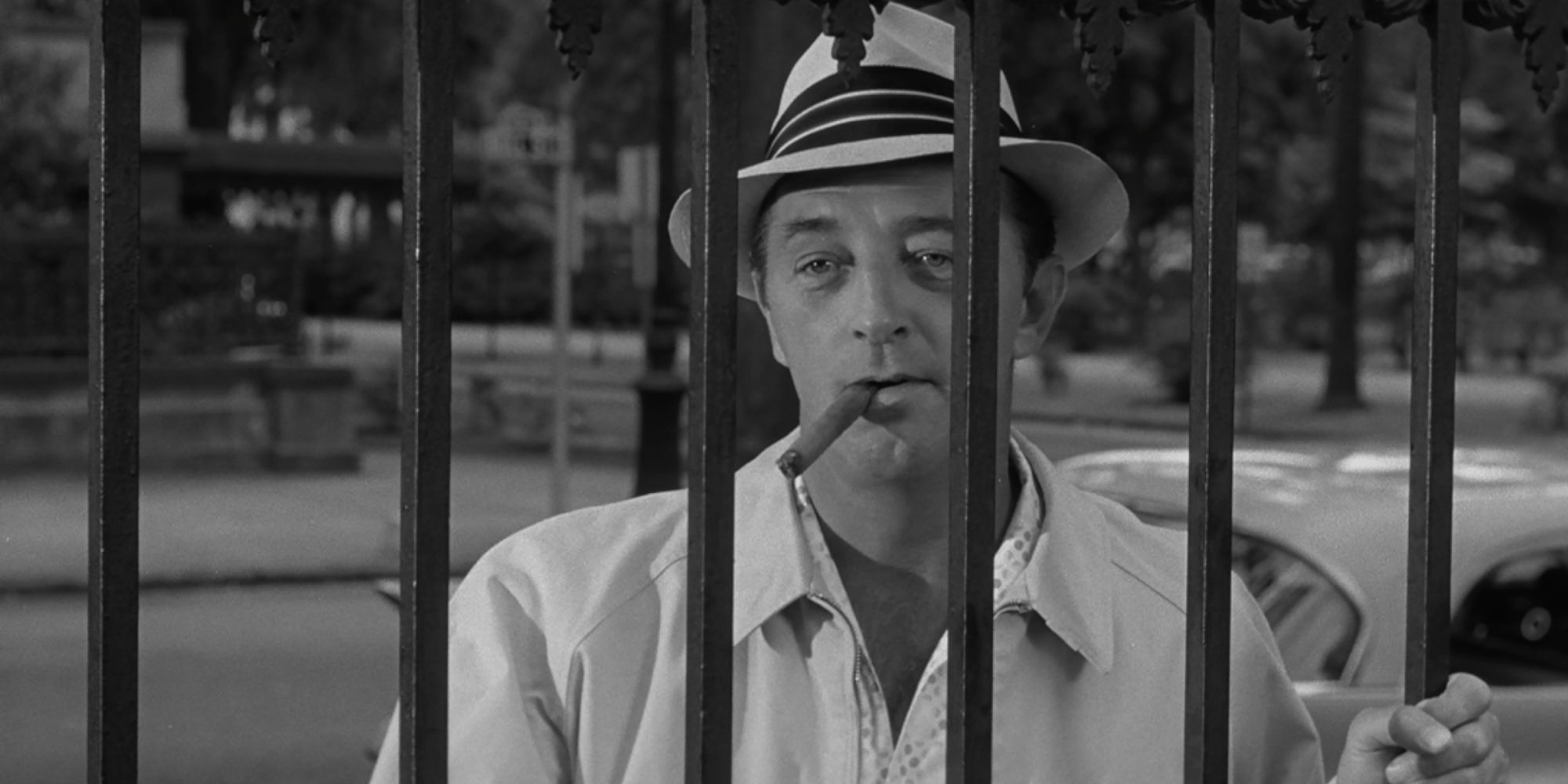 Image via Universal Pictures
Image via Universal Pictures
Robert Mitchum takes on the sinister role of a violent convict, Max Cady, who, after serving an eight-year term, sets his sights on an attorney who put him away, Sam Bowden (Gregory Peck). When Cady finally locates Bowden and his family, he begins to terrorize and stalk them, never crossing the line of breaking the law, making it almost impossible for Bowden to do anything but try and protect himself and his family at all costs.
Cape Fear is a gripping neo-noir (also considered to be a late classic noir) that also stars Polly Bergen, Telly Savalas, and Martin Balsam and was remade in 1991 by Martin Scorsese starring Robert De Niro and Nick Nolte. The entire cast gives exceptional performances, but Mitchum steals the show with his chilling performance as a sadistic psychopath who is out for vengeance, striking fear in anyone with just a single look. The aggressive shock value of the film's plot and capable cast are crucial, but Mitchum's petrifying performance alone is what lands Cape Fear on the list.
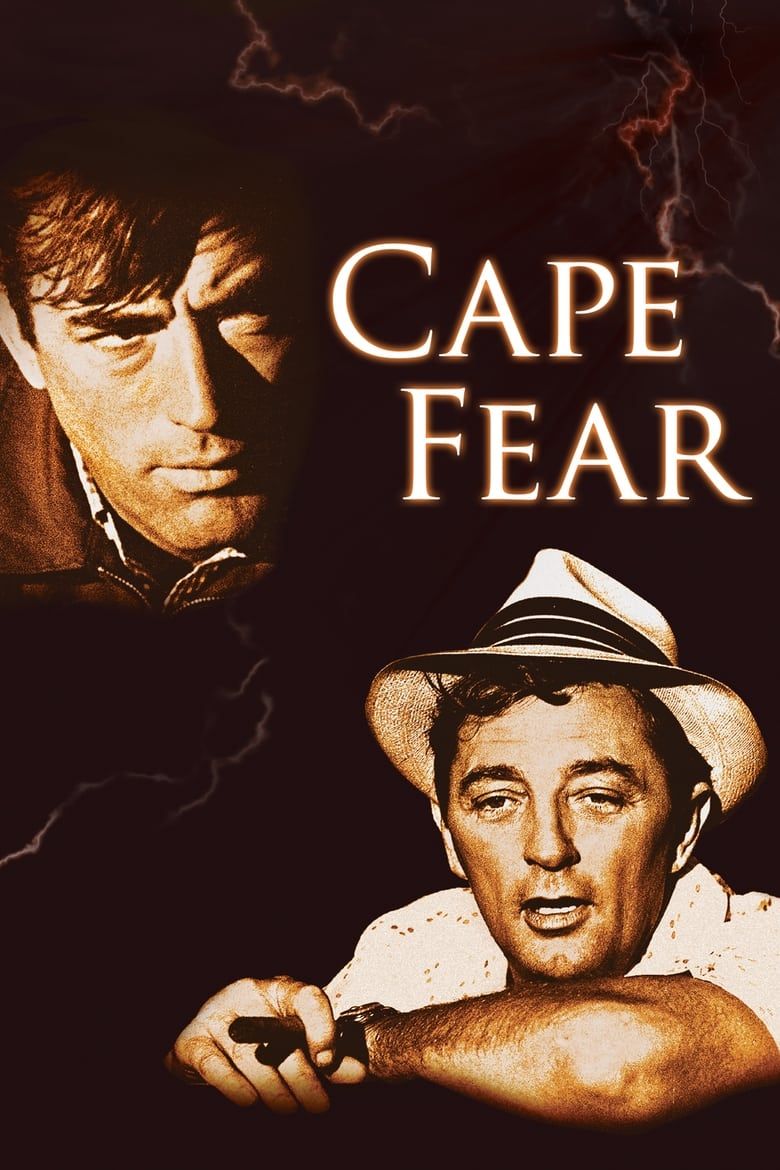
Cape Fear
Release Date April 12, 1962
Runtime 105 minutes
Director J. Lee Thompson
6 'Night Moves' (1975)
Directed by Arthur Penn
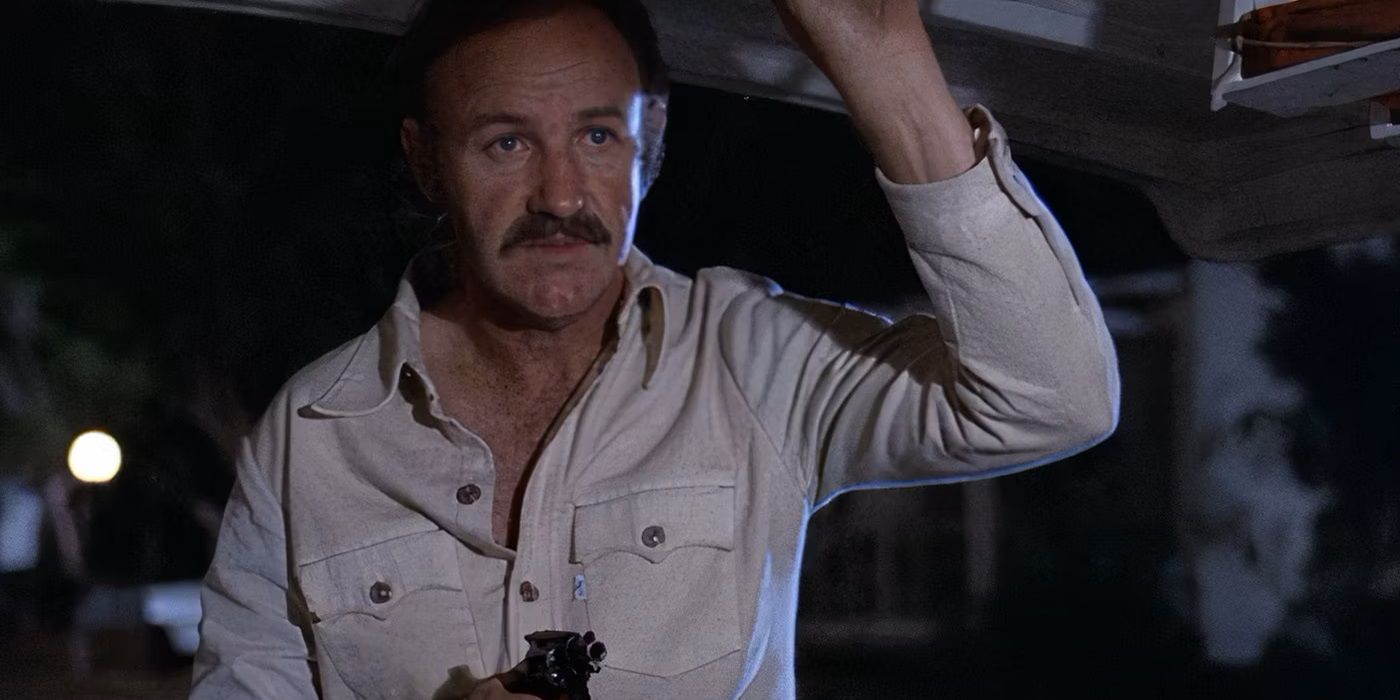 Image via Warner Bros.
Image via Warner Bros.
Gene Hackman stars in the marginalized neo-noir, Night Moves, as a Los Angeles private investigator, Harry Moseby, who is hired by a former B-actress to find her teenage daughter, Delly (Melanie Griffith), who has been missing for several weeks. When Moseby's investigation leads him to the Florida Keys, he locates the teen and convinces her to come back to Los Angeles with him, but as soon as they return, Delly ends up dead, leading Moseby to think there's more to the story as well as Delly's initial disappearance.
Initially, Night Moves wasn't a big success, but through the years, it has gained immense support and is now considered to be an essential neo-noir. The main attraction of the film is it follows a classic noir plot while meticulously leaving a trail of breadcrumbs that lead Hackman's character down a rabbit hole of murder, lies, and greed. Even when audiences think they figured it all out, Night Moves ends with a highly unexpected turn of events that will make any viewer watch it at least a dozen more times.
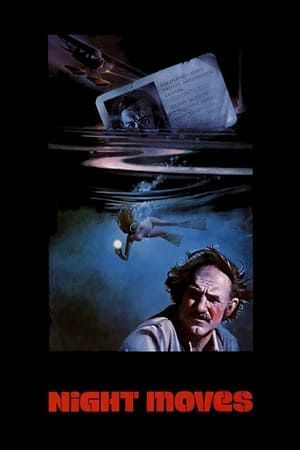
Night Moves
Release Date February 27, 1975
Runtime 100 Minutes
Director Arthur Penn
5 'L.A. Confidential' (1997)
Directed by Curtis Hanson
.jpg) Image via Warner Bros.
Image via Warner Bros.
Based on James Ellroy's 1990 novel, L.A. Confidential is a fitting tribute to the classic noir and follows the involvement of several Los Angeles police officers who are investigating a mysterious unsolved murder. Set during the 1950s, the film features an all-star cast including Russell Crowe, Guy Pearce, and Kevin Spacey, who all have their own personal interest in the unsolved homicide, which eventually leads to changing all of their lives forever.
L.A. Confidential is hands down one of the most beloved and rewatchable neo-noirs that also features dozens of elements of classic noir, ranging from the dark and gritty backdrop of Los Angeles to the cynical detectives and a seductive femme fatale. While the all-star cast delivers memorable performances, the real allure to L.A. Confidential is its authentic tone and incredibly detail-oriented atmosphere that effortlessly immerse audiences into its designated decade without coming off as cliché or oversaturated. L.A. Confidential earned nine Academy Award nominations, including Best Picture and Best Director, and went on to win for both Best Adapted Screenplay and Best Supporting Actress for Kim Basinger.
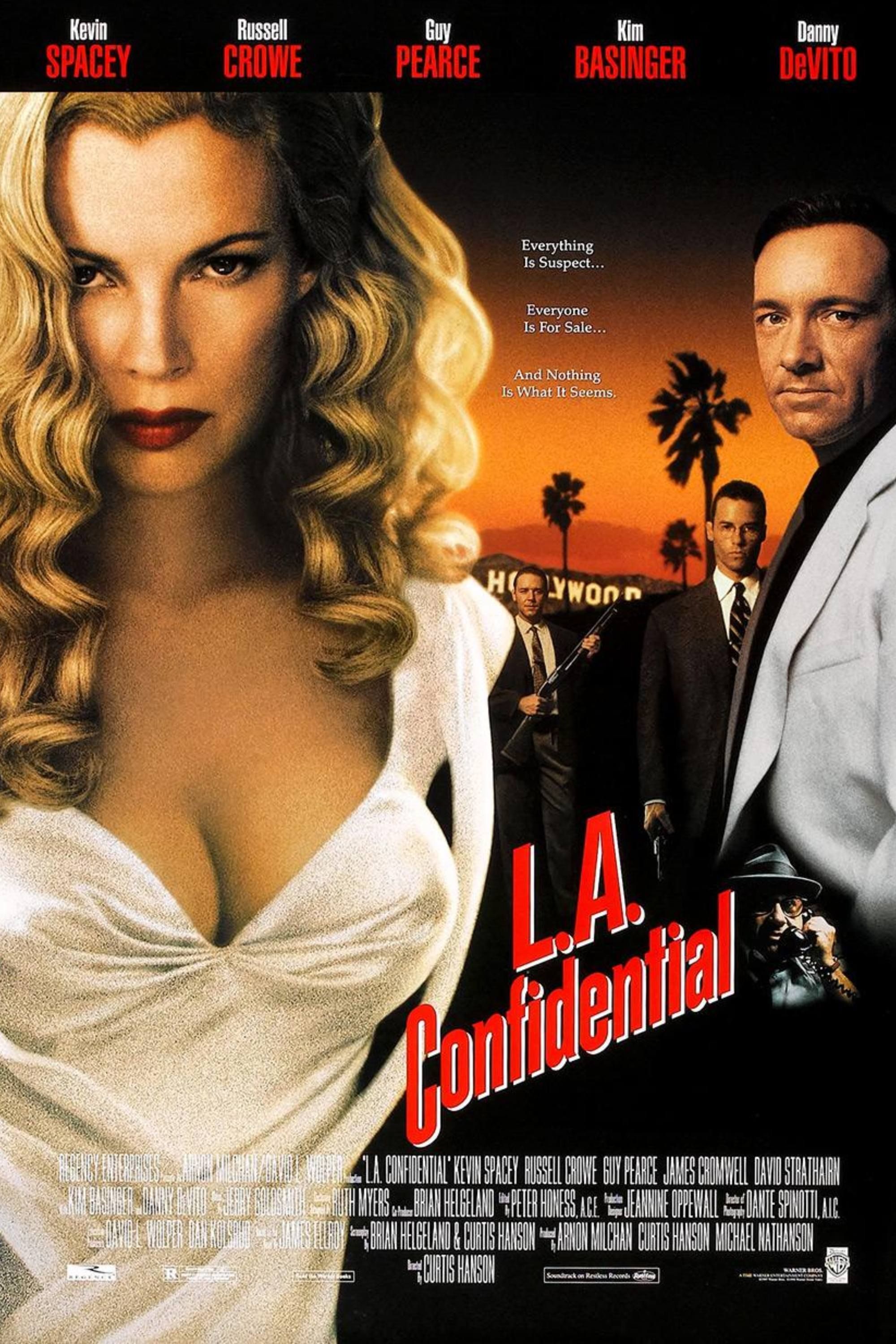
L.A. Confidential
Release Date September 19, 1997
Runtime 138 Minutes
Director Curtis Hanson
4 'Dirty Harry' (1971)
Directed by Don Siegel
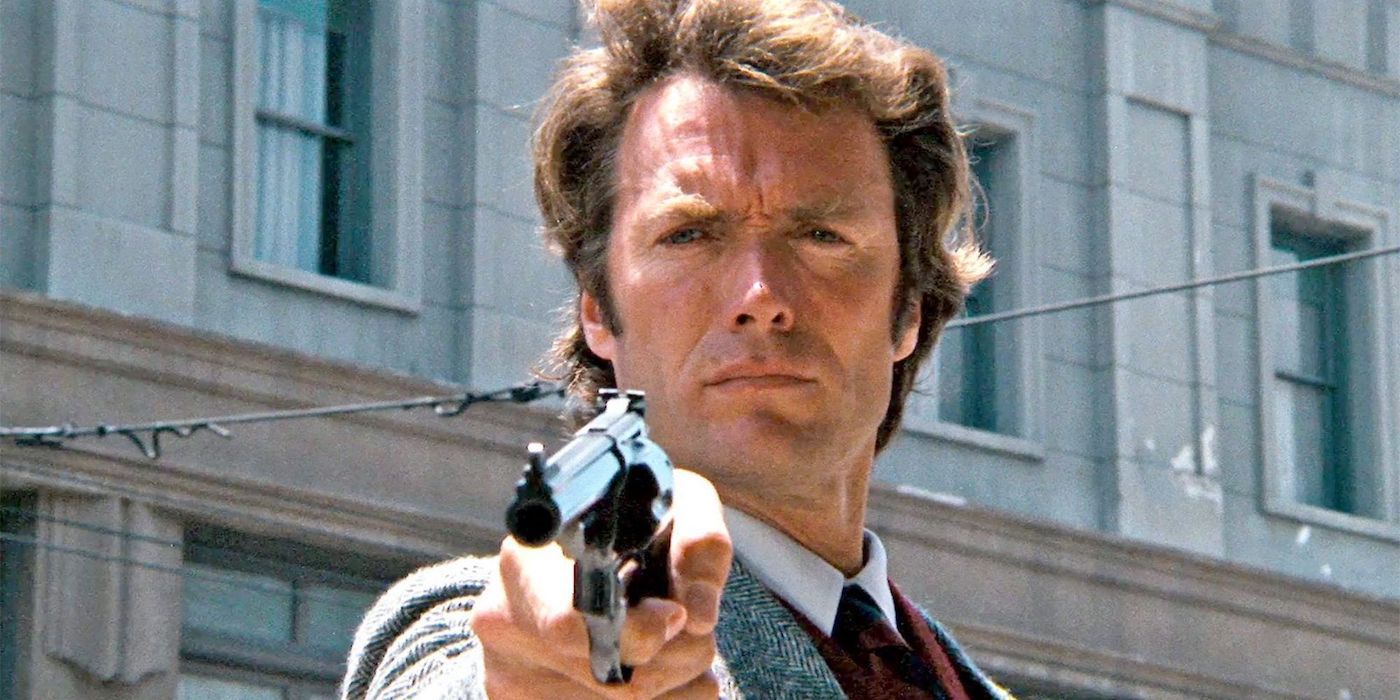 Image via Warner Bros.
Image via Warner Bros.
Clint Eastwood stars in one of his signature roles as San Francisco detective, Harry Callahan, in Dirty Harry, which is the first installment in the iconic franchise. When a psychopathic killer terrorizes the city, Callahan eventually apprehends the man known as Scorpio (Andy Robinson), but when it's revealed that the detective gained his evidence against Scorpio illegally, the department is forced to release him. Shortly after, Scorpio continues his murderous rampage, but this time, Callahan intends to deliver his own form of justice to the madman.
Dirty Harry is loosely based on the real-life serial killer, the Zodiac Killer, who was active in the Bay Area during the 1960s and, today, his identity remains unknown. The movie features an anti-hero who, despite his violent tendencies and toeing the line of the law, still easily earns the support of the audience, who can't help but root for him to catch the bad guy by any means necessary. Between the plot's perfect balance of suspense and action and Eastwood's portrayal of the unconventional, no-nonsense Callahan, there's no doubt that Dirty Harry is one of the most rewatchable neo-noirs to date.
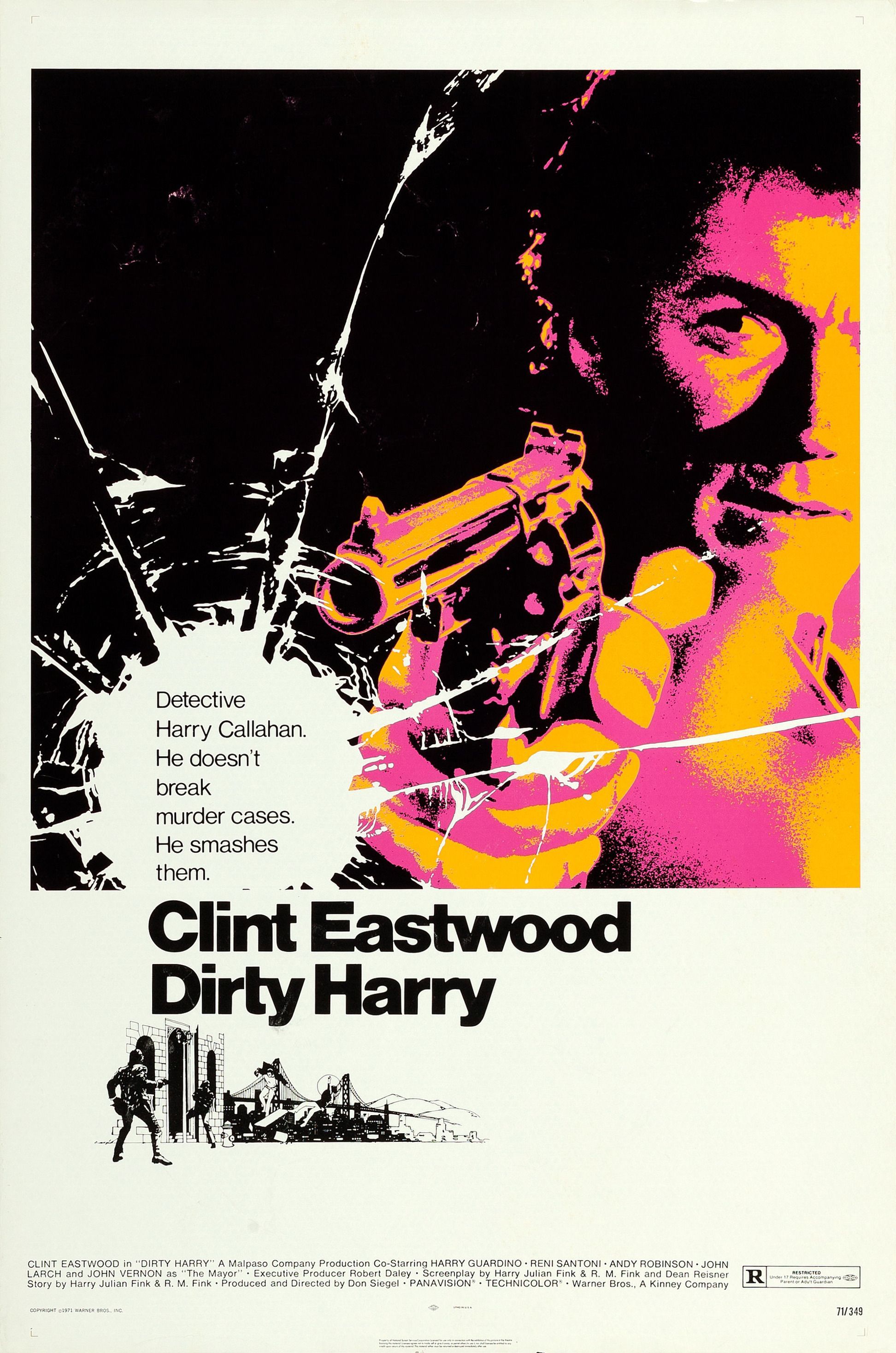
Dirty Harry
Release Date December 23, 1971
Runtime 102 minutes
Director Don Siegel
3 'No Country for Old Men' (2007)
Directed by Joel and Ethan Coen
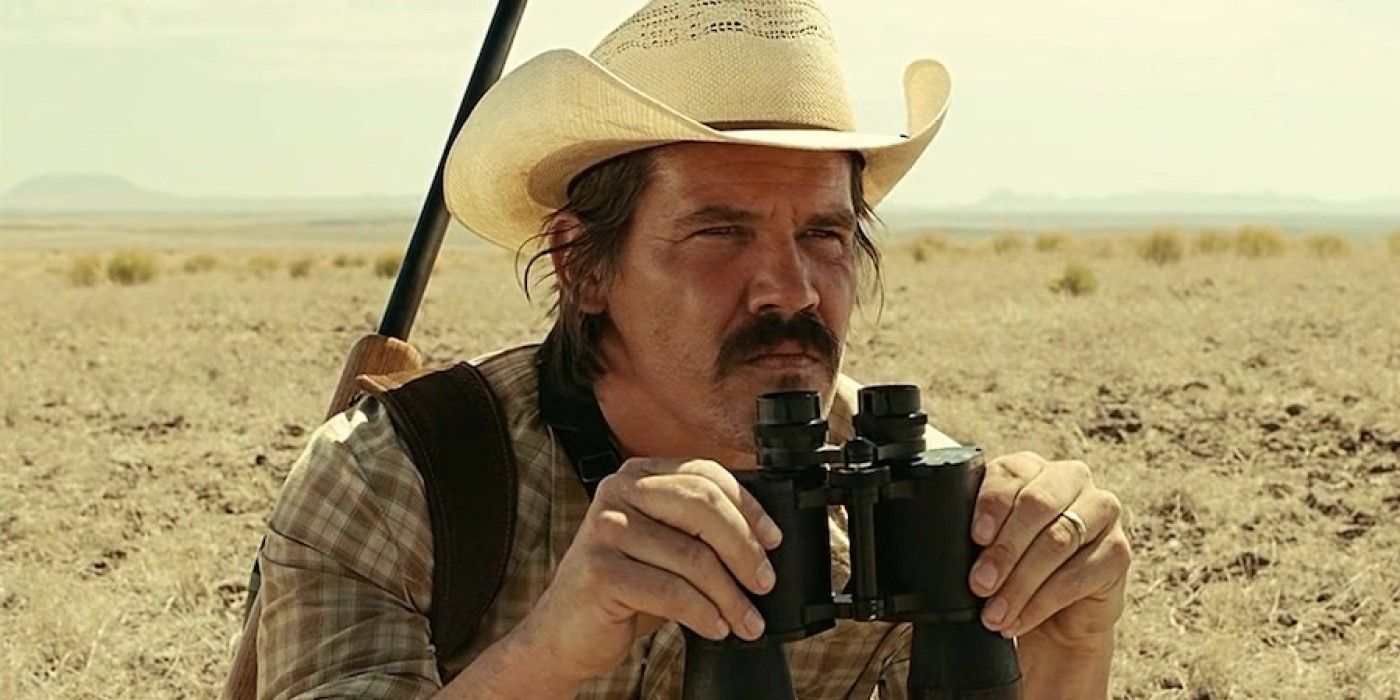 Image via Paramount Pictures
Image via Paramount Pictures
The Coen Brothers' Oscar-winning neo-noir, No Country for Old Men, is an intense game of cat and mouse between a sadistic hitman and a humble, everyday man who comes into possession of money from a drug deal gone bad. Josh Brolin stars as Llewelyn Moss who, while out hunting, comes across a bloody scene and a bag full of money that he can't resist taking. Unbeknownst to him, he is being tailed by a crazed sociopath, Anton Chigurh, played by Javier Bardem, who kills almost everyone he ever crosses paths with.
It's hard to pinpoint what exactly makes No Country for Old Men such a rewatchable neo-noir because there are too many elements to cover. For one, Bardem is simply mesmerizing but also horrifying as Chigurh, who is easily one of the Coen Brothers' best villains to appear on the big screen. Rather than carrying a firearm, he prefers an unexpected choice of weapon that only heightens the character's fearful image. Overall, No Country for Old Men depicts a setting of horrific violence and a cruel fate that is strangely attractive for viewers to peer into and perhaps the sole reason that film fans keep going back to time and time again.
2 'Taxi Driver' (1976)
Directed by Martin Scorsese
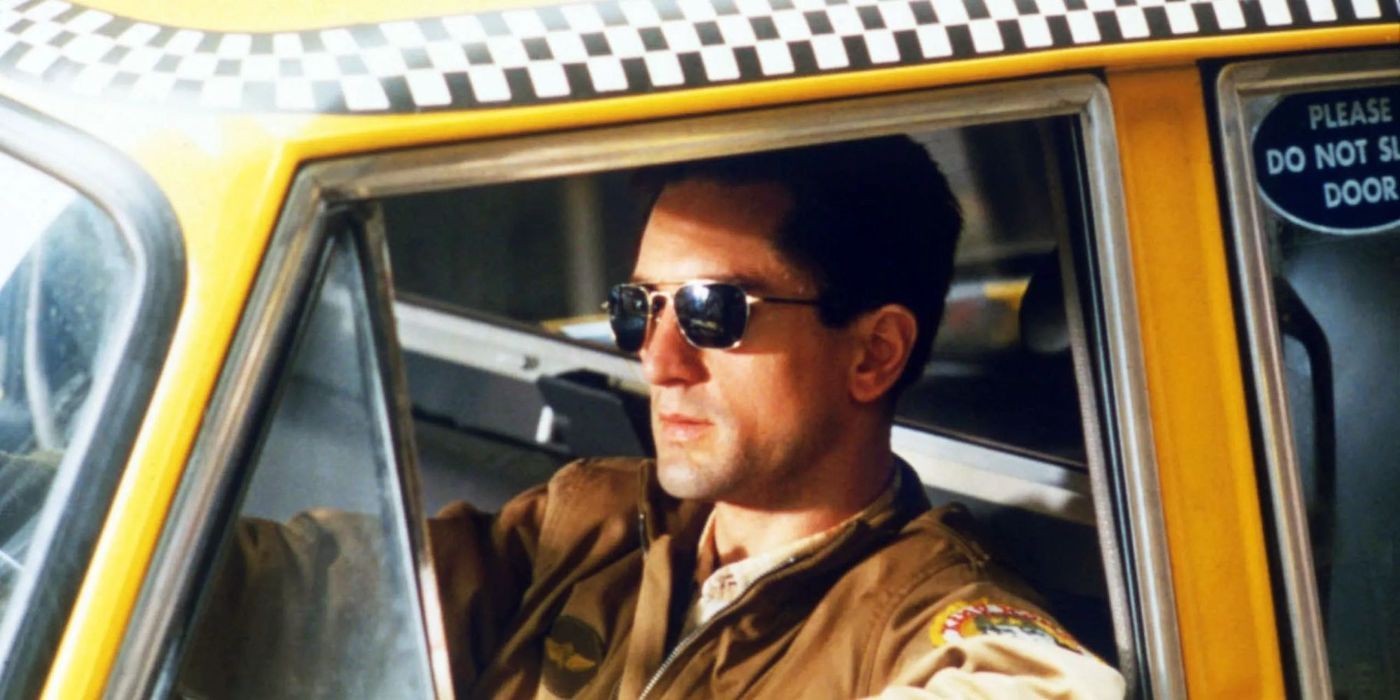 Image via Columbia Pictures
Image via Columbia Pictures
Martin Scorsese's Taxi Driver is credited as a pivotal neo-noir that contributed to the subgenre's initial popularity and features Robert De Niro in one of his finest performances. De Niro takes on the role of a loner cab driver and Vietnam War veteran, Travis Bickle, who is slowly losing his grip on reality as his mental state continues to deteriorate day by day. As he becomes detached from reality, Bickle soon starts to believe that he is meant to save the world and, in an attempt to fulfill his destiny, he tries to save a young sex worker (Jodie Foster) from a life of pain and suffering.
De Niro's performance is beyond compelling and serves as the sole reason why Taxi Driver is such a rewatchable neo-noir today. Bickle's inevitable journey down a dark path of violence and destruction is like trying to look away from a car crash. It's hard to witness, but no matter how hard audiences try to turn away, Bickle remains suffering and striving to find a purpose in the morally decaying world he's forced to live in. Due to the film's excessive violence and graphic content, Taxi Driver was controversial for some, but it still received four Academy Award nominations, including Best Actor, Best Supporting Actress, and Best Picture.
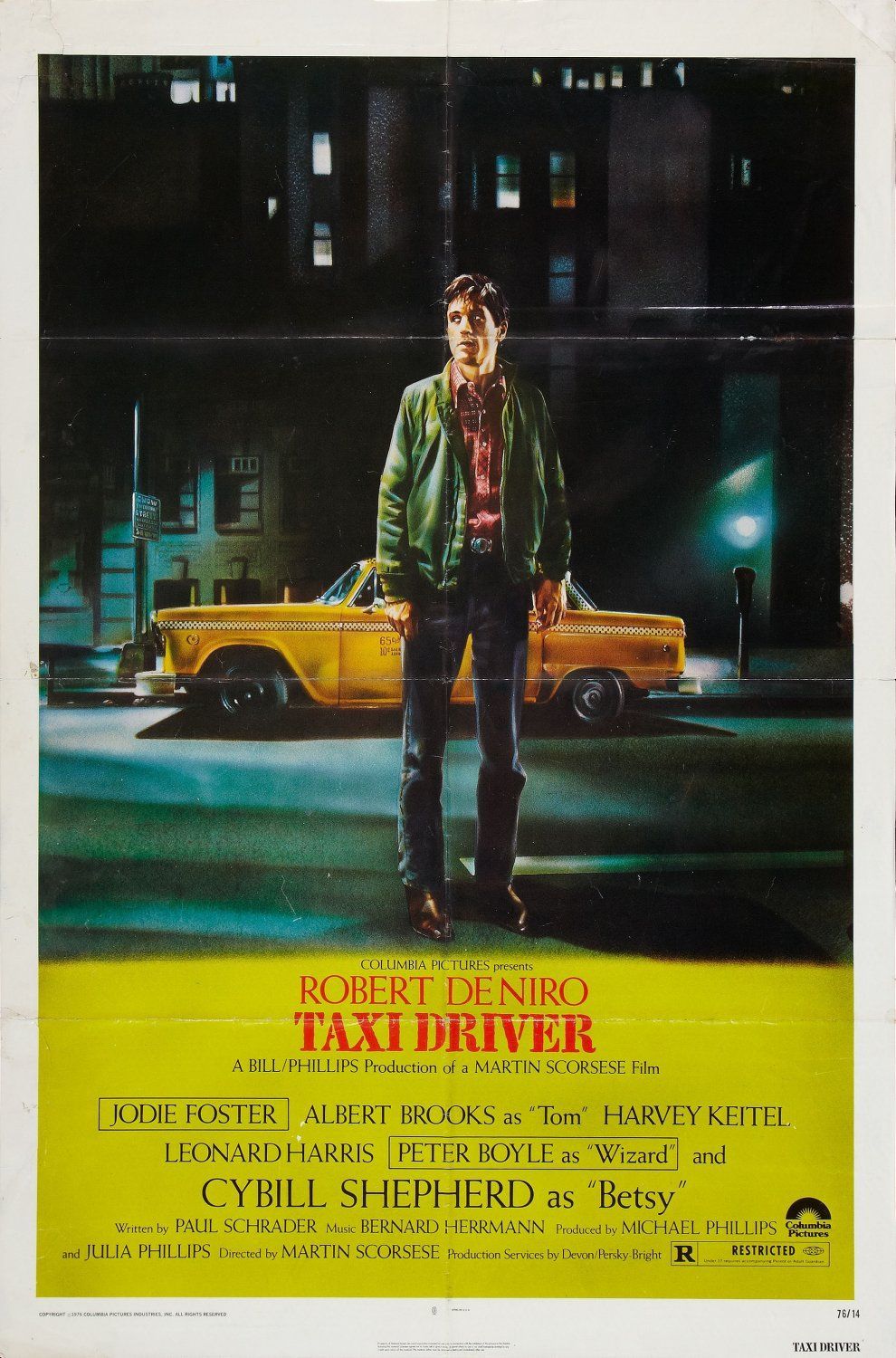
Taxi Driver
Release Date February 9, 1976
Runtime 114 Minutes
1 'Chinatown' (1974)
Directed by Roman Polanski
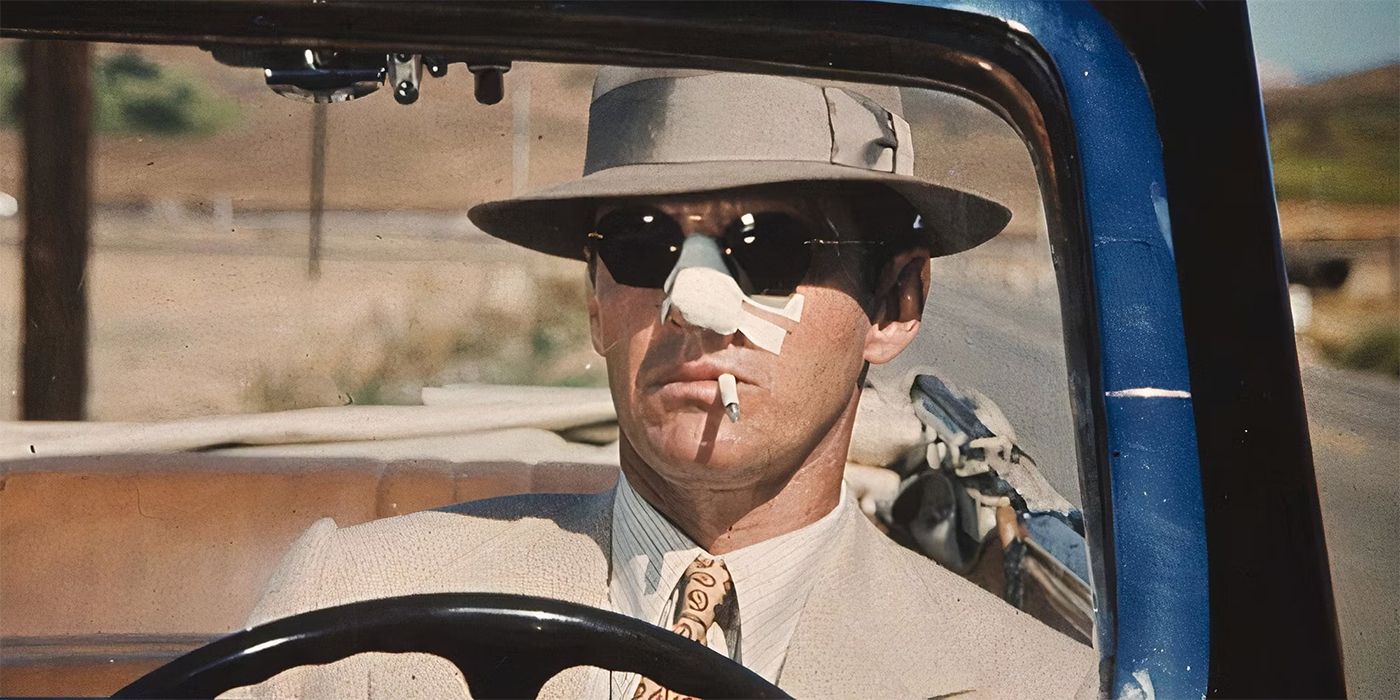 Image via Paramount Pictures
Image via Paramount Pictures
Chinatown is considered to be one of the greatest neo-noirs of all time, effectively establishing the terms and limits of the film genre. Jack Nicholson stars as a Los Angeles private eye, Jake Gittes, who is hired by a woman, Evelyn Mulwary, to tail her husband's daily activities. What starts as a probable case of infidelity takes an unexpected turn when Gittes discovers that the woman who hired him isn't Mulwray. When the real Mulwray's (Faye Dunaway) husband ends up murdered, Gittes becomes entangled in a web of corruption and dark family secrets which all lead to Mulwray's father, Noah Cross (John Huston).
The film accurately conveys Los Angeles during the 1930s with immense attention to detail all the way down to dialogue and historical elements that give an ominous impression that audiences are also caught in a nightmarish scandal. Nicholson delivers a showstopping performance as the ideal hardboiled gumshoe who finds himself way in over his head, similar to Humphrey Bogart's Sam Spade in The Maltese Falcon. Even though countless qualities make Chinatown one of the most rewatchable neo-noir films, at the end of the day, Robert Towne's flawless screenplay and intricate story are what ultimately seals the deal. Despite receiving eleven Oscar nominations, Chinatown only won for Best Original Screenplay, which is regarded by many as one of the best film noir screenplays of all time.
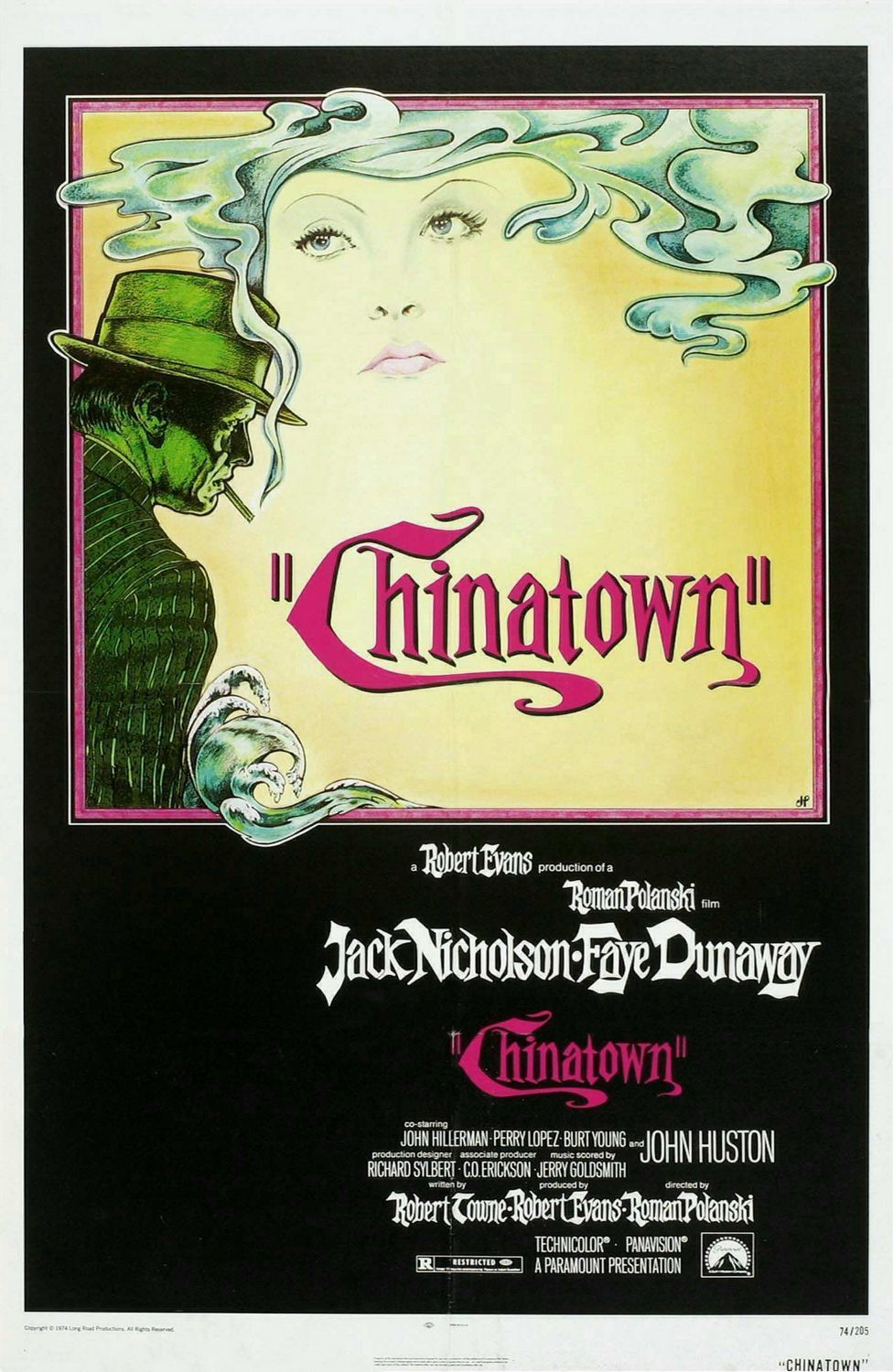
Chinatown
Release Date June 20, 1974
Runtime 130 minutes
Director Roman Polanski


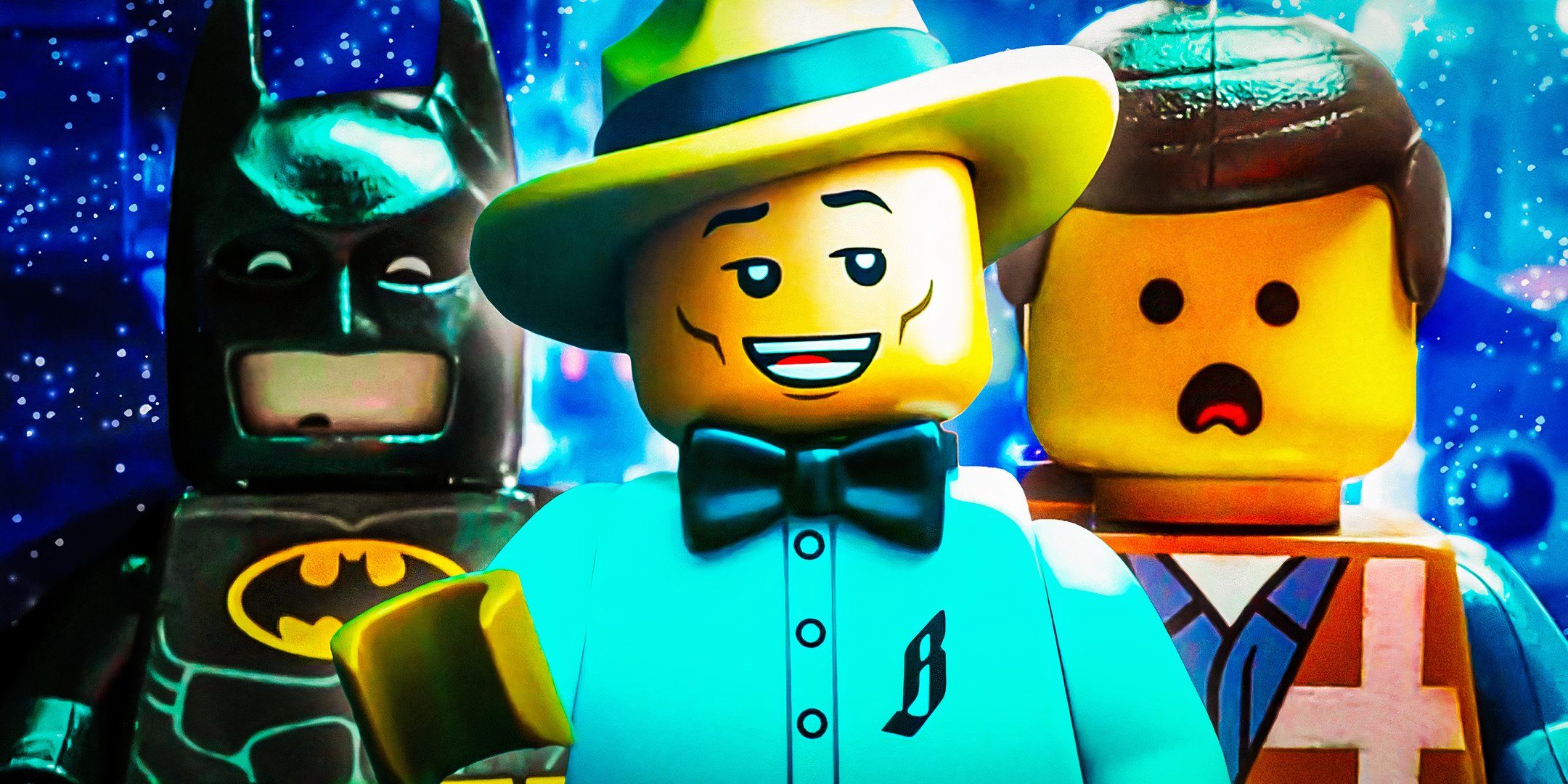
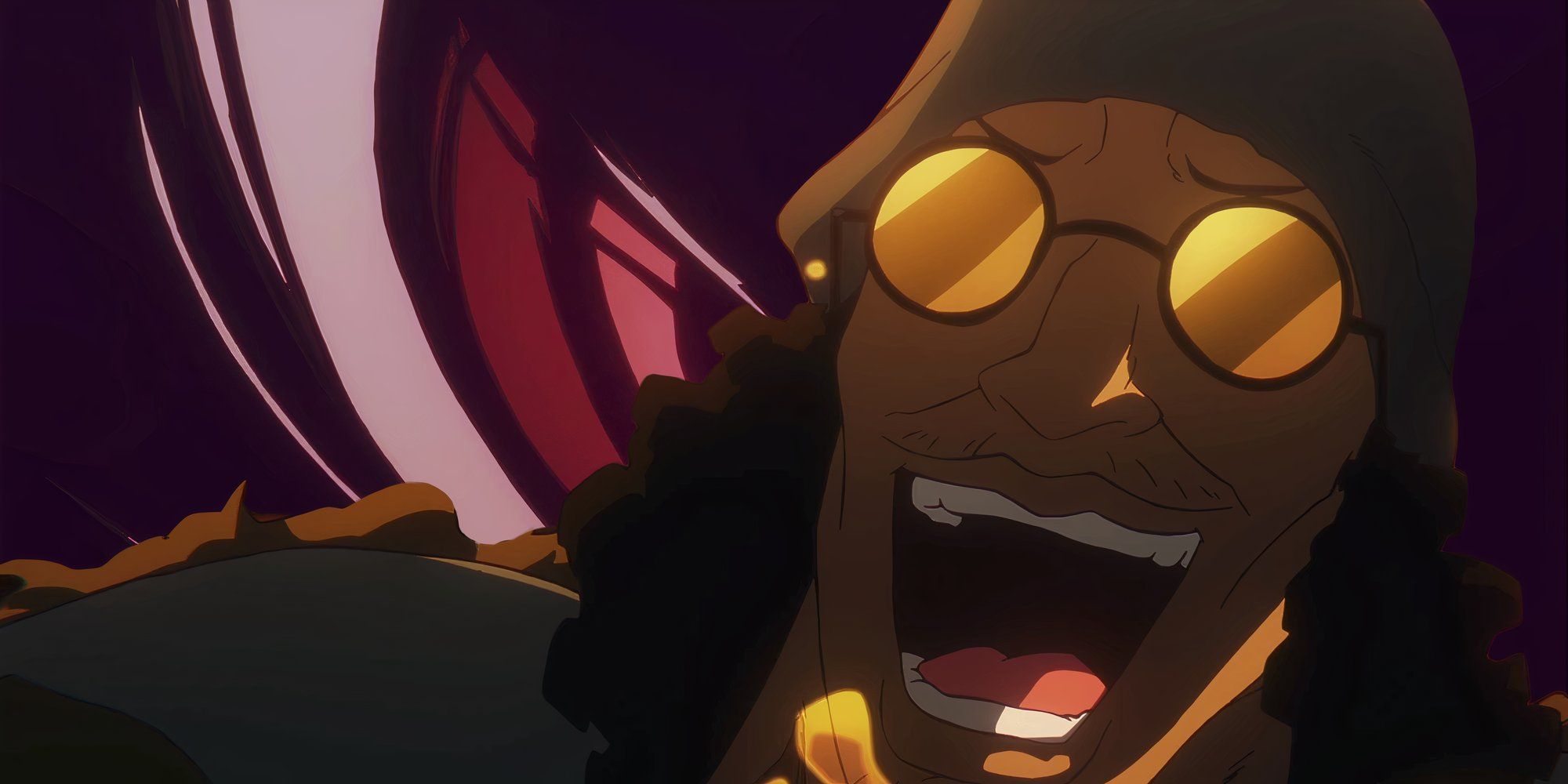





 English (US) ·
English (US) ·